The software tools for any businesses play a crucial role in the modern workplace, providing organizations with the means to streamline their operations, enhance productivity, and achieve their strategic objectives. These tools encompass a wide range of applications and platforms that cater to various business functions, from project management and customer relationship management (CRM) to accounting and human resources.
By making use of business software tools, companies can automate repetitive tasks, optimize resource allocation, and gain valuable insights through data analysis. This not only saves time and effort but also enables better decision-making, leading to improved efficiency and profitability.
One of the key benefits of software tools is their ability to foster collaboration and communication within an organization. With the rise of remote work and geographically dispersed teams, these tools provide a centralized platform where employees can collaborate on projects, share documents, and communicate seamlessly.
Features like real-time messaging, video conferencing, and file sharing facilitate effective teamwork and ensure everyone is on the same page, regardless of their physical location. Moreover, many business tools integrate with popular productivity suites, allowing for seamless data exchange and enhanced workflow management.

In addition to facilitating internal collaboration, the software tools for businesses also enable companies to engage with their customers more effectively. CRM software, for instance, allows businesses to manage and track customer interactions, sales leads, and marketing campaigns. This enables personalized customer service, targeted marketing efforts, and the ability to identify potential opportunities for upselling or cross-selling.
By using the data and insights provided by these tools, companies can improve customer satisfaction, build stronger relationships, and ultimately drive revenue growth. Furthermore, with the integration of artificial intelligence and machine learning capabilities, software tools for businesses can analyze customer data to identify trends, predict customer behavior, and optimize sales and marketing strategies.
In short, the software tools for businesses have become indispensable assets for organizations across various industries. They empower businesses to streamline their operations, enhance collaboration, and improve customer engagement.
With the capabilities of these tools, companies can gain a competitive edge, drive innovation, and achieve their goals more efficiently. As technology continues to advance, the landscape of software tools for businesses is expected to evolve, offering even more sophisticated solutions to meet the ever-changing needs of the modern business world.
Contents
- 1 Why do you need business software tools?
- 2 What are the benefits of business software tools?
- 2.1 1. Increased efficiency and productivity
- 2.2 2. Improved collaboration and communication
- 2.3 3. Enhanced decision-making
- 2.4 4. Better customer engagement
- 2.5 5. Streamlined operations and cost savings
- 2.6 6. Scalability and adaptability
- 2.7 7. Data security and compliance
- 2.8 8. Better inventory management
- 2.9 9. Enhanced customer service
- 2.10 10. Performance monitoring and analytics
- 2.11 11. Streamlined reporting and compliance
- 2.12 What are the types of business software tools?
- 2.13 1. Enterprise resource planning (ERP) software
- 2.14 2. Customer relationship management (CRM) software
- 2.15 3. Project management software
- 2.16 4. Accounting software
- 2.17 5. Human resources management systems (HRMS)
- 2.18 6. Business intelligence (BI) and analytics tools
- 2.19 7. Communication and collaboration tools
- 2.20 8. Marketing automation software
- 2.21 9. Supply chain management (SCM) software
- 2.22 10. Customer support and help desk software
- 3 50 best business software tools
- 4 5 best ERP software tools
- 5 5 best CRM software tools
- 6 5 best project management software tools
- 7 5 best accounting software tools
- 8 5 best HRMS software tools
- 9 5 best communication and collaboration software tools
- 10 5 best SCM software tools
- 11 Conclusion
Why do you need business software tools?
Software tools for businesses are essential for organizations to ensure compliance, manage risks, facilitate scalability, and support sustainable growth. These tools provide the necessary infrastructure, automation, and insights to navigate the complexities of modern business environments, enabling organizations to stay competitive, optimize processes, and achieve their strategic objectives.
Software tools for businesses are essential for several reasons. Here are 5 key reasons why organizations need best business software tools:
- Efficiency and productivity
- Data management and analysis
- Enhanced customer engagement
- Compliance and risk management
- Scalability and growth
1. Efficiency and productivity
Software tools for businesses automate repetitive tasks and streamline operations, leading to increased efficiency and productivity. These tools can handle various business functions such as project management, accounting, inventory management, and more, allowing employees to focus on higher-value tasks.
By automating processes and providing centralized platforms for collaboration and communication, software tools for businesses help teams work more efficiently and achieve better results.
2. Data management and analysis
Software tools for businesses enable organizations to collect, store, and analyze large amounts of data. This data can provide valuable insights into customer behavior, market trends, and business performance.
With the help of data analytics and reporting features, businesses can make informed decisions, identify opportunities for growth, and optimize their strategies. By harnessing the power of data, organizations can gain a competitive edge and make data-driven decisions.
3. Enhanced customer engagement
Software tools for businesses, particularly customer relationship management (CRM) systems, enable businesses to effectively manage and engage with their customers. CRM tools help track customer interactions, manage leads, and personalize customer experiences.
With a comprehensive view of customer data, organizations can deliver personalized marketing campaigns, provide excellent customer service, and build stronger relationships. By leveraging software tools for businesses, companies can improve customer satisfaction, loyalty, and ultimately drive business growth.
4. Compliance and risk management
Software tools for businesses can help organizations ensure compliance with legal and regulatory requirements and effectively manage risks. Tools such as compliance management systems and risk assessment software enable businesses to establish and enforce internal controls, monitor compliance with industry standards, and mitigate risks.
By automating compliance processes and providing robust risk management frameworks, these tools help organizations avoid penalties, maintain a good reputation, and safeguard against potential threats.
5. Scalability and growth
Software tools for businesses are designed to adapt to the evolving needs of a growing organization. Whether it’s expanding operations, adding new products or services, or entering new markets, these tools provide the scalability required to support business growth.
From enterprise resource planning (ERP) systems that integrate various business functions to project management tools that handle complex projects, organizations can leverage software tools for businesses to scale their operations efficiently and effectively, reducing the challenges associated with growth and maximizing opportunities for expansion.
Overall, software tools for businesses are crucial for organizations to streamline operations, make data-driven decisions, and enhance customer engagement. These tools empower businesses to work more efficiently, optimize their processes, and stay competitive in today’s fast-paced and data-driven business landscape.
What are the benefits of business software tools?
Software tools for businesses provide a wide range of benefits, including data security, improved inventory management, enhanced customer service, performance monitoring, and streamlined reporting. By leveraging these tools, organizations can optimize operations, provide better customer experiences, make data-driven decisions, and ensure compliance with regulations, ultimately driving growth and success.
Software tools for businesses offer numerous benefits to organizations, empowering them to operate more efficiently, make informed decisions, and drive growth. Here are 11 key benefits of business software tools:
- Increased efficiency and productivity
- Improved collaboration and communication
- Enhanced decision-making
- Better customer engagement
- Streamlined operations and cost savings
- Scalability and adaptability
- Data security and compliance
- Better inventory management
- Enhanced customer service
- Performance monitoring and analytics
- Streamlined reporting and compliance
1. Increased efficiency and productivity
Software tools for businesses automate manual tasks, streamline processes, and eliminate repetitive work, leading to improved efficiency and productivity. By reducing the time and effort required for administrative tasks, employees can focus on high-value activities, resulting in enhanced productivity across the organization.
2. Improved collaboration and communication
Software tools for businesses provide centralized platforms for collaboration and communication, facilitating seamless teamwork, regardless of geographical locations. Features like real-time messaging, video conferencing, and file sharing enable efficient communication and knowledge sharing, fostering collaboration among team members, departments, and even external stakeholders.
3. Enhanced decision-making
Software tools for businesses generate valuable insights through data analysis and reporting. By leveraging these insights, organizations can make data-driven decisions, identify trends, and forecast outcomes. This enables better strategic planning, optimized resource allocation, and improved risk management, ultimately leading to more informed and effective decision-making.
4. Better customer engagement
Software tools for businesses, such as CRM systems, enable organizations to manage customer relationships effectively. By centralizing customer data, businesses can personalize interactions, deliver targeted marketing campaigns, and provide exceptional customer service. This results in enhanced customer satisfaction, loyalty, and increased chances of repeat business.
5. Streamlined operations and cost savings
Software tools for businesses automate and optimize various business processes, reducing manual errors and saving time and resources. This leads to streamlined operations, increased operational efficiency, and cost savings. For example, accounting software can automate financial processes, reducing the need for manual data entry and improving accuracy.
6. Scalability and adaptability
Software tools for businesses are designed to support the growth and changing needs of organizations. They provide scalability and adaptability, allowing businesses to easily scale their operations, add new functionalities, and integrate with other systems as required, ensuring that the tools can evolve alongside the organization.
7. Data security and compliance
Software tools for businesses often include robust security features to protect sensitive data. They offer encryption, access controls, and backup mechanisms to ensure data security and integrity. Additionally, these tools assist organizations in complying with industry regulations and data protection laws, reducing the risk of data breaches and non-compliance penalties.
8. Better inventory management
Software tools for businesses that incorporate inventory management capabilities enable organizations to track inventory levels, streamline procurement processes, and optimize stock levels. By having real-time visibility into inventory, businesses can avoid stockouts, reduce carrying costs, and improve order fulfillment, leading to improved customer satisfaction and operational efficiency.
9. Enhanced customer service
Customer service management software enables organizations to provide exceptional customer support. These tools centralize customer inquiries, track support tickets, and provide customer self-service options. By improving response times, resolving issues efficiently, and maintaining a consistent service experience, organizations can enhance customer satisfaction and loyalty.
10. Performance monitoring and analytics
Software tools for businesses often include performance monitoring and analytics functionalities, allowing organizations to track key performance indicators (KPIs) and measure progress towards business goals.
By monitoring metrics such as sales revenue, customer acquisition costs, or project milestones, organizations can identify areas for improvement, track performance trends, and make data-backed adjustments to achieve better outcomes.
11. Streamlined reporting and compliance
Many software tools for businesses offer reporting features that automate the creation and distribution of reports. This streamlines reporting processes, reduces manual effort, and ensures consistent and accurate reporting across the organization. Furthermore, compliance-related reporting requirements can be met more efficiently, saving time and resources and reducing the risk of errors.
Software tools for businesses offer a wide range of benefits, including increased efficiency, improved collaboration, better decision-making, enhanced customer engagement, streamlined operations, and scalability. By leveraging these tools, organizations can gain a competitive edge, optimize processes, and drive sustainable growth.
What are the types of business software tools?
There are various types of software tools for businesses available to cater to different aspects of organizational operations and management. Depending on the specific needs and requirements of an organization, there are numerous specialized tools and solutions available for various functions and industries. However, the below are just a few examples of the types of software tools for businesses available.
Here are some common types of software tools for businesses:
- Enterprise resource planning (ERP) software
- Customer relationship management (CRM) software
- Project management software
- Accounting software
- Human resources management systems (HRMS)
- Business intelligence (BI) and analytics tools
- Communication and collaboration tools
- Marketing automation software
- Supply chain management (SCM) software
- Customer support and help desk software
1. Enterprise resource planning (ERP) software
ERP software integrates and manages core business processes such as finance, human resources, supply chain management, inventory, and customer relationship management. It provides a centralized database and facilitates efficient data flow across different departments, enhancing overall productivity and collaboration.
2. Customer relationship management (CRM) software
CRM software helps organizations manage customer interactions, track leads, and streamline sales and marketing efforts. It enables businesses to centralize customer data, track customer interactions, and optimize customer engagement to enhance customer satisfaction and drive sales growth.
3. Project management software
Project management software assists in planning, organizing, and tracking projects from start to finish. It allows teams to collaborate, assign tasks, set deadlines, track progress, and manage resources effectively. Project management tools help streamline workflows, improve team communication, and ensure successful project completion.
4. Accounting software
Accounting software automates financial processes such as bookkeeping, invoicing, payroll management, and financial reporting. It simplifies financial record-keeping, facilitates accurate financial analysis, and ensures compliance with accounting standards and tax regulations.
5. Human resources management systems (HRMS)
HRMS software helps organizations manage various HR functions, including employee data management, recruitment, performance management, benefits administration, and training. It streamlines HR processes, improves employee engagement, and ensures efficient HR operations.
6. Business intelligence (BI) and analytics tools
BI and analytics tools enable organizations to analyze and visualize data, providing insights into business performance, customer behavior, market trends, and more. These tools help in making data-driven decisions, identifying opportunities, and optimizing strategies for better business outcomes.
7. Communication and collaboration tools
Communication and collaboration tools facilitate seamless communication and collaboration within teams and across the organization. They include email clients, messaging platforms, video conferencing tools, file sharing platforms, and project collaboration software, enabling effective teamwork and knowledge sharing.
8. Marketing automation software
Marketing automation software automates repetitive marketing tasks such as email marketing, social media management, lead generation, and customer segmentation. It helps streamline marketing campaigns, nurture leads, and improve marketing efficiency and effectiveness.
9. Supply chain management (SCM) software
SCM software optimizes supply chain operations, including inventory management, procurement, logistics, and demand forecasting. It helps organizations improve supply chain efficiency, reduce costs, and enhance overall supply chain visibility and responsiveness.
10. Customer support and help desk software
Customer support and help desk software assists organizations in managing customer inquiries, support tickets, and service requests. These tools provide a centralized platform for tracking and resolving customer issues, managing service-level agreements, and ensuring timely and efficient customer support.
Features often include ticket management, knowledge base creation, self-service portals, and reporting capabilities to enhance customer satisfaction and streamline support operations.
50 best business software tools
Software tools for businesses encompass a vast array of applications designed to support and enhance various aspects of organizational operations. These tools play a critical role in helping businesses streamline processes, improve productivity, and achieve their goals more effectively.
From project management and accounting software to customer relationship management (CRM) and data analytics tools, the range of software available is extensive and tailored to meet specific business needs.
These tools provide businesses with the means to automate repetitive tasks, centralize data, facilitate collaboration, and gain valuable insights that drive informed decision-making. By leveraging software tools, businesses can optimize resource allocation, improve efficiency, and gain a competitive edge in today’s fast-paced business landscape.
The benefits of business software tools are far-reaching. Firstly, they enable efficient workflow management by automating manual tasks and reducing human error. By eliminating time-consuming administrative processes, employees can focus on high-value work, leading to increased productivity and improved outcomes.
Software tools foster collaboration and communication, facilitating seamless information sharing and teamwork among team members, regardless of their physical locations. This enhances overall efficiency and supports effective collaboration, especially in remote work environments. Moreover, software tools enable businesses to gain valuable insights from data through analytics and reporting features.
These insights help organizations identify trends, track performance, and make data-driven decisions that drive growth and innovation. By leveraging the power of data, businesses can optimize operations, identify areas for improvement, and stay ahead of the competition.
In conclusion, business software tools are invaluable resources that enable organizations to streamline operations, improve collaboration, and make informed decisions based on data insights. The availability of diverse software options tailored to different business functions empowers organizations to optimize their processes, enhance productivity, and drive growth in an increasingly digital and competitive business landscape.
Embracing and leveraging these software tools can give businesses a strategic advantage, positioning them for success in their respective industries. Here are such 50 software tools for businesses that you must know:
50 best business software tools 2023:
- Oracle NetSuite
- Epicor
- Infor
- SAP ERP
- IFS
- Salesforce
- HubSpot
- Pipedrive
- Zoho Corporation
- Keap
- Wrike
- Asana
- Trello
- Jira
- Microsoft Project
- Xero
- FreshBooks
- QuickBooks
- Wave
- Sage Group
- BambooHR
- Workday
- ADP
- SAP Success Factors
- Zenefits
- Tableau
- Qlik
- Looker
- Sisense
- Microsoft Power Bi
- Slack
- Flock
- GoToMeeting
- Zoom
- Skype for Business
- Marketo
- ActiveCampaign
- Pardot
- Mailchimp
- Constant Contact
- SAP
- Blue Yonder
- E2open
- Oracle
- Odoo
- Zendesk Support Suite
- Zoho Desk
- Freshdesk
- Hiver
- Help Scout
5 best ERP software tools
1. Oracle NetSuite
Oracle NetSuite ERP is a comprehensive cloud-based enterprise resource planning (ERP) software solution that offers businesses a robust suite of tools to streamline their operations, improve efficiency, and drive growth. With its modular architecture, NetSuite ERP provides a scalable and customizable platform that caters to businesses of all sizes and industries.
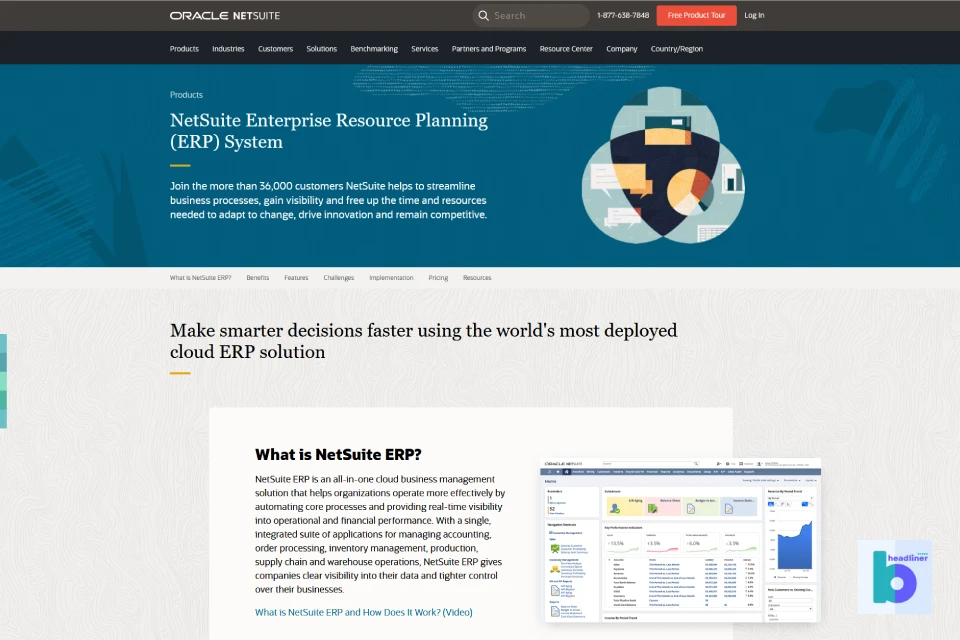
It integrates key business functions such as financial management, inventory and supply chain management, order management, customer relationship management (CRM), and e-commerce capabilities, all in a single unified system.
NetSuite ERP empowers organizations with real-time visibility into their business performance and data, allowing for informed decision-making. It provides a centralized database, eliminating the need for disparate systems and manual data entry, ensuring data accuracy and consistency. With built-in analytics and reporting functionalities, businesses can gain actionable insights, track key performance indicators, and optimize operations for better efficiency and profitability.
NetSuite ERP offers flexibility and scalability, allowing businesses to adapt and grow as their needs evolve. It supports multi-subsidiary management, multi-currency transactions, and localization for global operations, making it suitable for organizations operating across multiple regions. Additionally, NetSuite’s cloud-based nature provides accessibility from anywhere, enabling remote work and collaboration.
2. Epicor
Epicor ERP is a robust and flexible enterprise resource planning (ERP) software solution designed to meet the diverse needs of businesses across industries. With its comprehensive suite of modules, Epicor ERP enables organizations to streamline their operations, enhance productivity, and drive business growth. The software covers essential areas such as finance, inventory management, supply chain, manufacturing, sales, and customer relationship management (CRM).
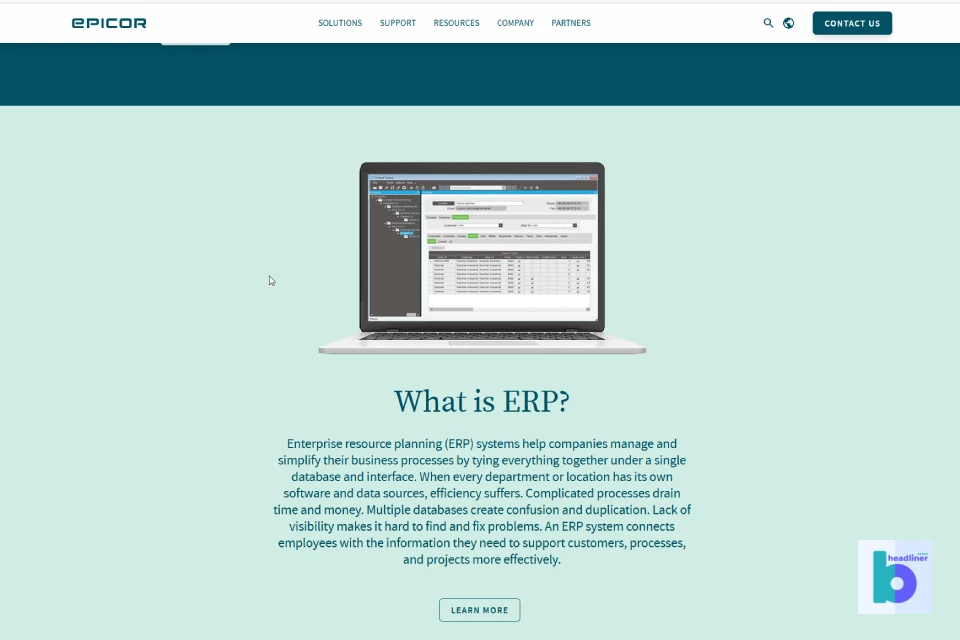
One of the key strengths of Epicor ERP is its ability to accommodate the unique requirements of different industries, including manufacturing, distribution, retail, and services. The software offers industry-specific features and functionalities, allowing businesses to align their processes with specific industry regulations and best practices. Epicor ERP empowers organizations to optimize their supply chain, manage inventory efficiently, improve production planning, and deliver exceptional customer service.
Epicor ERP provides real-time visibility into business data and analytics, enabling informed decision-making. The software offers robust reporting and analysis tools that allow organizations to gain insights, monitor key performance indicators, and identify areas for improvement. With its scalable and flexible architecture, Epicor ERP can adapt to changing business needs and accommodate growth, making it a valuable tool for organizations aiming to expand and evolve.
3. Infor
Infor ERP is a powerful enterprise resource planning software solution that helps organizations optimize their operations, improve productivity, and drive business growth. Infor ERP offers a range of modules and industry-specific functionalities to cater to the unique needs of various sectors such as manufacturing, distribution, healthcare, and more. With its user-friendly interface and intuitive design, Infor ERP enables businesses to streamline processes across finance, supply chain management, manufacturing, human resources, and customer relationship management.
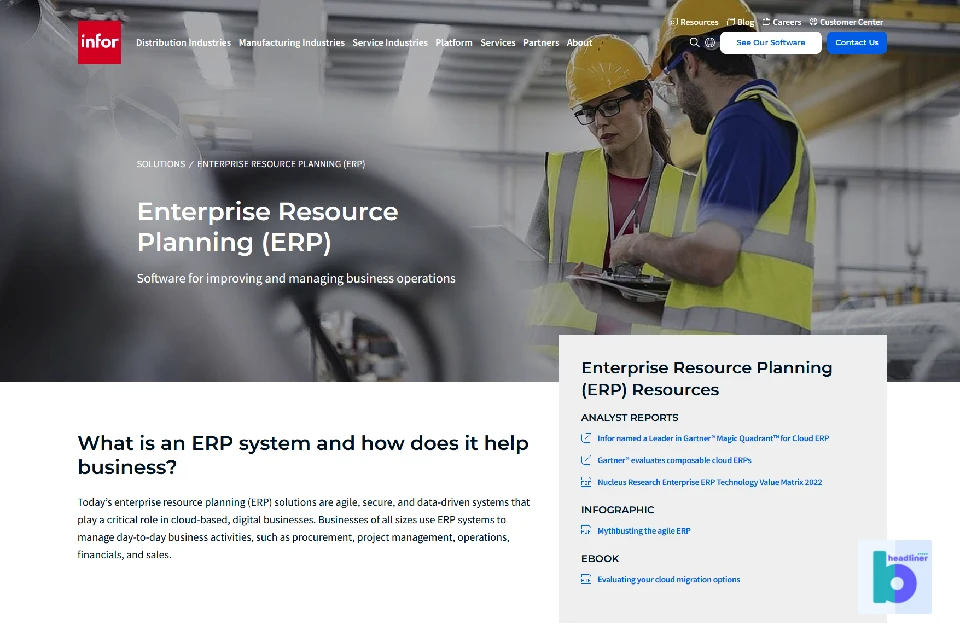
One of the key strengths of Infor ERP is its focus on industry-specific requirements. The software provides specialized features and tools tailored to specific industries, ensuring that organizations can effectively address the unique challenges and regulations they face. Infor ERP empowers businesses to automate workflows, optimize inventory management, streamline production processes, and enhance customer satisfaction through personalized experiences and efficient order fulfillment.
Infor ERP offers robust analytics and reporting capabilities, enabling organizations to gain insights into their performance and make data-driven decisions. The software provides real-time visibility into key metrics, allowing businesses to monitor performance, track trends, and identify areas for improvement. By leveraging these insights, organizations can optimize processes, identify cost-saving opportunities, and drive operational excellence.
4. SAP ERP
SAP ERP is a leading enterprise resource planning software solution that helps businesses effectively manage and integrate their key business processes. With its comprehensive suite of modules, SAP ERP enables organizations to streamline operations across areas such as finance, human resources, supply chain management, procurement, manufacturing, and sales. The software provides a centralized database and real-time data visibility, allowing for accurate and timely decision-making.
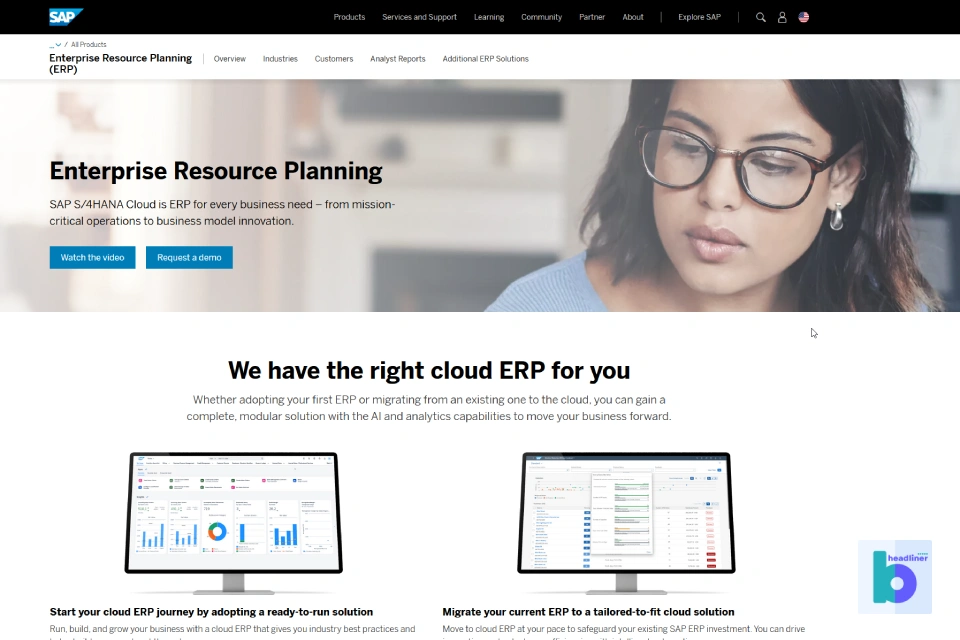
One of the key strengths of SAP ERP is its scalability and flexibility. The software can adapt to the evolving needs of businesses, whether they are small enterprises or global corporations. SAP ERP supports multi-currency transactions, multi-language capabilities, and localization for various countries and industries, making it suitable for organizations with international operations. Additionally, SAP ERP offers industry-specific solutions tailored to meet the unique requirements of sectors such as manufacturing, retail, healthcare, and more.
SAP ERP provides advanced analytics and reporting capabilities, empowering organizations to gain valuable insights from their data. The software enables businesses to monitor key performance indicators, track trends, and identify areas for improvement. With its integration capabilities, SAP ERP allows for seamless data flow between different departments, enhancing collaboration and enabling efficient end-to-end processes.
5. IFS
IFS ERP is a comprehensive enterprise resource planning software solution that empowers organizations to streamline their operations, improve efficiency, and achieve business success.
With its broad range of modules and industry-specific functionalities, IFS ERP caters to the unique needs of various sectors, including manufacturing, engineering, construction, and service industries. The software offers a centralized platform that integrates key business functions such as finance, supply chain management, project management, human resources, and customer relationship management.
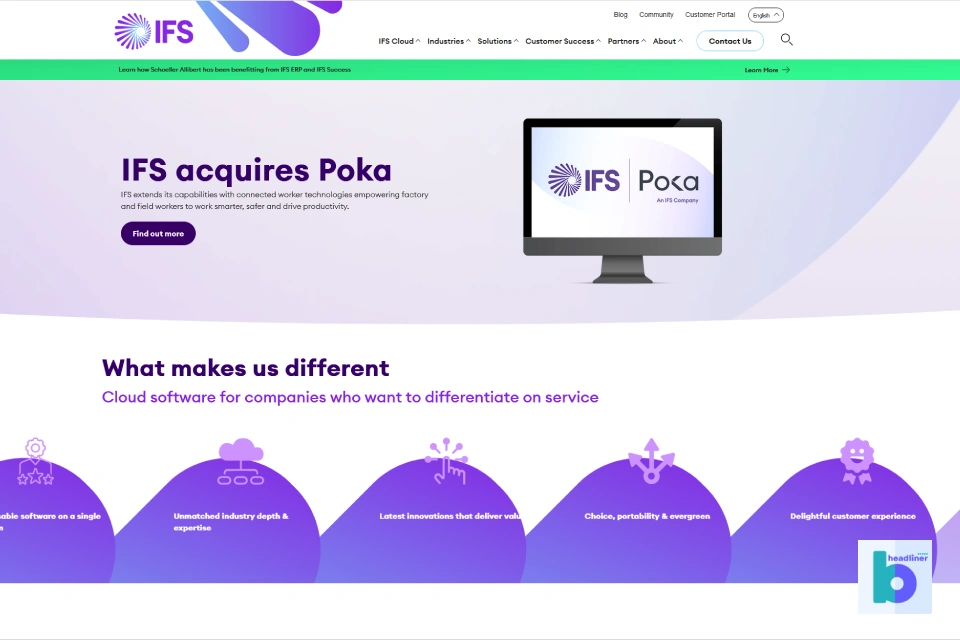
One of the notable strengths of IFS ERP is its focus on delivering a holistic view of an organization’s operations. The software provides real-time data visibility, enabling businesses to make informed decisions based on accurate and up-to-date information.
IFS ERP facilitates efficient planning and execution of projects, optimizes inventory management, streamlines financial processes, and enhances customer service through effective order management and support.
IFS ERP offers advanced analytics and reporting capabilities, allowing organizations to analyze performance, track key performance indicators, and identify areas for improvement. The software enables businesses to gain valuable insights into their operations, anticipate market trends, and drive continuous improvement initiatives. With its flexibility and scalability, IFS ERP accommodates the changing needs of businesses as they grow and expand into new markets.
5 best CRM software tools
6. Salesforce
Salesforce is a leading customer relationship management (CRM) platform that revolutionizes the way businesses manage their sales, marketing, and customer service operations. With its cloud-based architecture and extensive suite of applications, Salesforce offers organizations a comprehensive solution to enhance customer engagement, drive sales growth, and improve overall customer satisfaction.
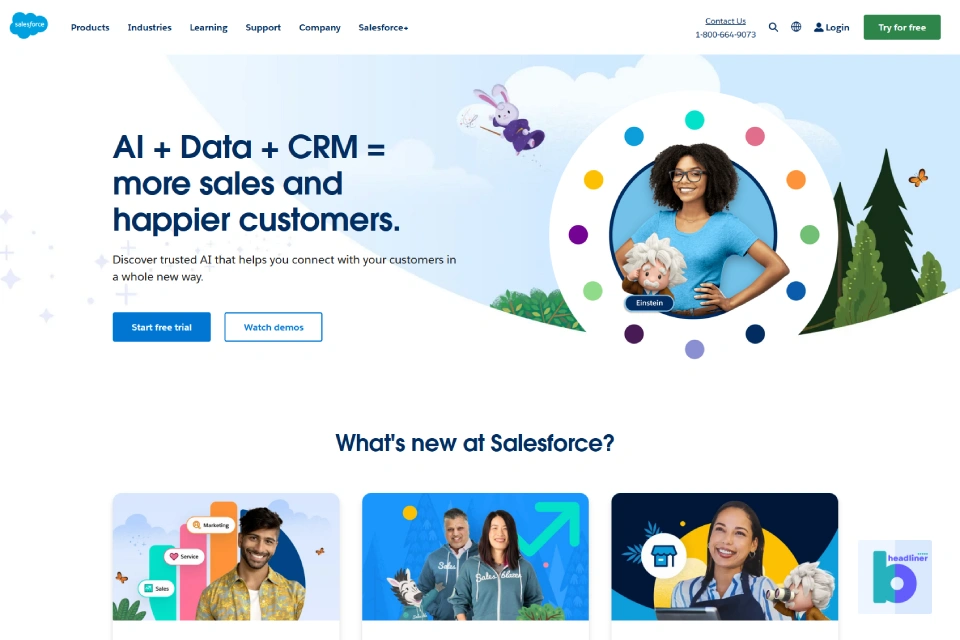
The platform enables businesses to centralize customer data, track leads and opportunities, automate sales processes, and gain valuable insights into customer behavior and preferences.
One of the key strengths of Salesforce is its flexibility and scalability. The platform can be customized to meet the specific needs of businesses across industries and sizes, from small startups to large enterprises.
Salesforce provides a range of modules and functionalities, including sales cloud, service cloud, marketing cloud, and commerce cloud, enabling organizations to manage all aspects of their customer interactions in a seamless and integrated manner.
Salesforce offers a wide array of third-party integrations and a vibrant marketplace of applications, known as the AppExchange, which allows businesses to extend the capabilities of the platform and tailor it to their unique requirements.
This ecosystem of apps and integrations further enhances the value and functionality of Salesforce, making it a versatile solution for organizations aiming to optimize their customer relationship management processes.
7. HubSpot
HubSpot is a comprehensive inbound marketing and sales software platform that helps businesses attract, engage, and delight customers. With its suite of integrated tools, HubSpot offers organizations the ability to manage various aspects of their marketing, sales, customer service, and CRM activities in one centralized platform.
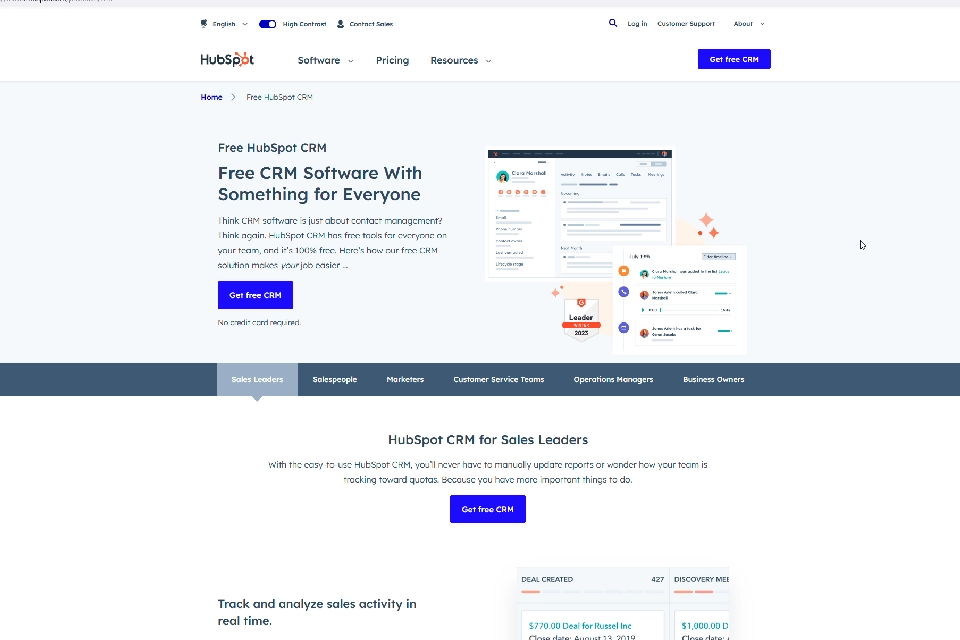
HubSpot provides features such as email marketing, social media management, content management, lead generation, customer analytics, and more.
One of the key strengths of HubSpot is its focus on inbound marketing methodology, which emphasizes creating valuable content, nurturing leads, and building lasting customer relationships. The platform enables businesses to create and optimize content, attract visitors through search engine optimization (SEO) and social media, convert leads through landing pages and forms, and engage customers through personalized marketing campaigns.
HubSpot also offers robust sales and customer service tools that help organizations effectively manage their interactions with prospects and customers. The platform provides features such as contact management, pipeline tracking, email tracking, ticketing systems, and live chat capabilities, enabling businesses to streamline their sales processes and deliver excellent customer support.
8. Pipedrive
Pipedrive is a leading customer relationship management (CRM) software solution designed to help businesses manage their sales processes more effectively.
With its intuitive and user-friendly interface, Pipedrive provides organizations with a comprehensive set of tools to track leads, manage deals, and automate sales workflows. The platform allows businesses to visualize their sales pipeline, monitor the progress of deals, and prioritize activities to close more deals efficiently.
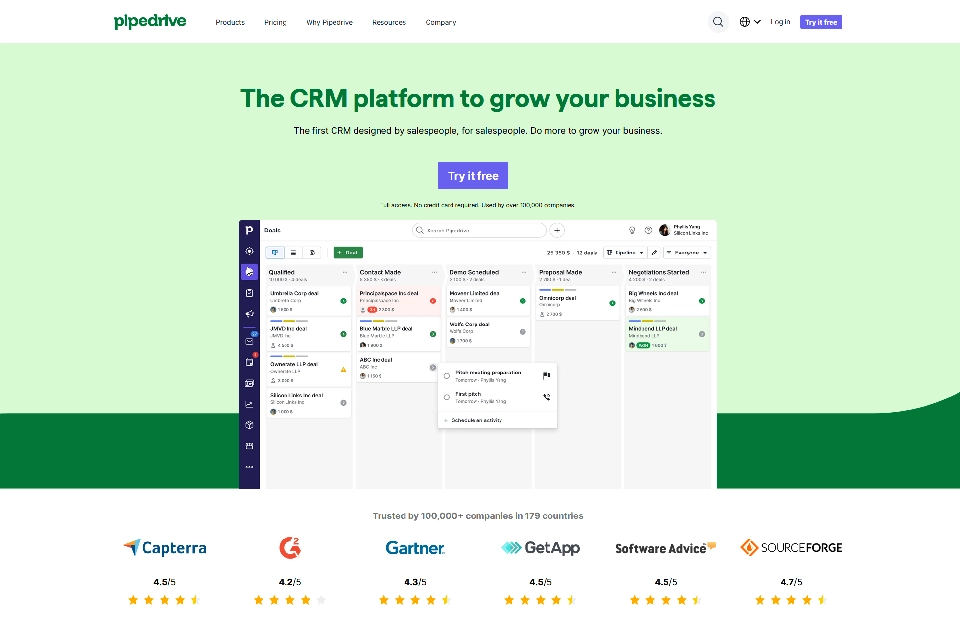
One of the key strengths of Pipedrive is its focus on simplicity and ease of use. The software provides a streamlined and intuitive user experience, making it accessible for sales teams of all sizes and technical expertise levels. Pipedrive offers customizable pipelines and stages, allowing businesses to tailor the CRM to their specific sales processes and industry requirements.
Pipedrive also offers robust communication and collaboration features, enabling seamless teamwork and coordination among sales team members. The platform integrates with popular communication tools like email and messaging applications, ensuring all relevant information is centralized and easily accessible within the CRM.
Pipedrive provides valuable analytics and reporting capabilities to track sales performance, measure key metrics, and identify areas for improvement. The software offers visual dashboards and customizable reports that provide insights into sales activities, conversion rates, and revenue forecasting, empowering businesses to make data-driven decisions to drive sales growth.
9. Zoho Corporation
Zoho Corporation is a global software company that offers a comprehensive suite of cloud-based business applications designed to help organizations streamline their operations and enhance productivity.
With a diverse portfolio of products, Zoho Corporation provides solutions for customer relationship management (CRM), finance, human resources, project management, collaboration, and more. The company’s applications are known for their user-friendly interfaces, extensive functionality, and affordability, making them accessible to businesses of all sizes and industries.
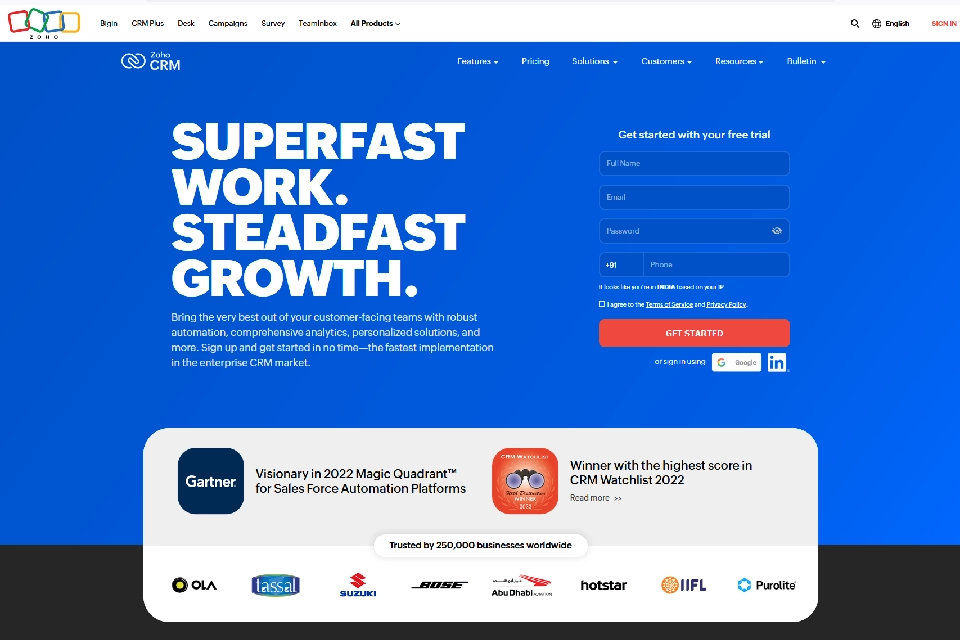
One of the key strengths of Zoho Corporation is its focus on integration and providing a unified experience for users. Zoho’s suite of applications seamlessly integrate with each other, allowing businesses to share data and streamline workflows across departments. This integrated approach enhances collaboration and efficiency, enabling organizations to operate more cohesively and effectively.
Zoho Corporation emphasizes data security and privacy. Their cloud-based solutions are hosted on highly secure servers, with robust encryption and data protection measures in place. This commitment to security ensures that businesses can trust Zoho’s applications to store and manage their critical data safely.
Zoho Corporation also stands out for its commitment to customer support and continuous innovation. The company offers extensive resources, including documentation, forums, and customer service, to assist users in maximizing the value of their products. Additionally, Zoho Corporation regularly releases updates and new features, incorporating user feedback and staying ahead of industry trends.
10. Keap
Keap, formerly known as Infusionsoft, is a comprehensive small business CRM and marketing automation platform designed to help entrepreneurs and small businesses effectively manage their customer relationships and grow their businesses.
Keap provides a suite of tools that automate repetitive tasks, streamline communication, and nurture leads throughout the customer journey. The platform offers features such as contact management, email marketing, lead scoring, appointment scheduling, and sales pipeline management.
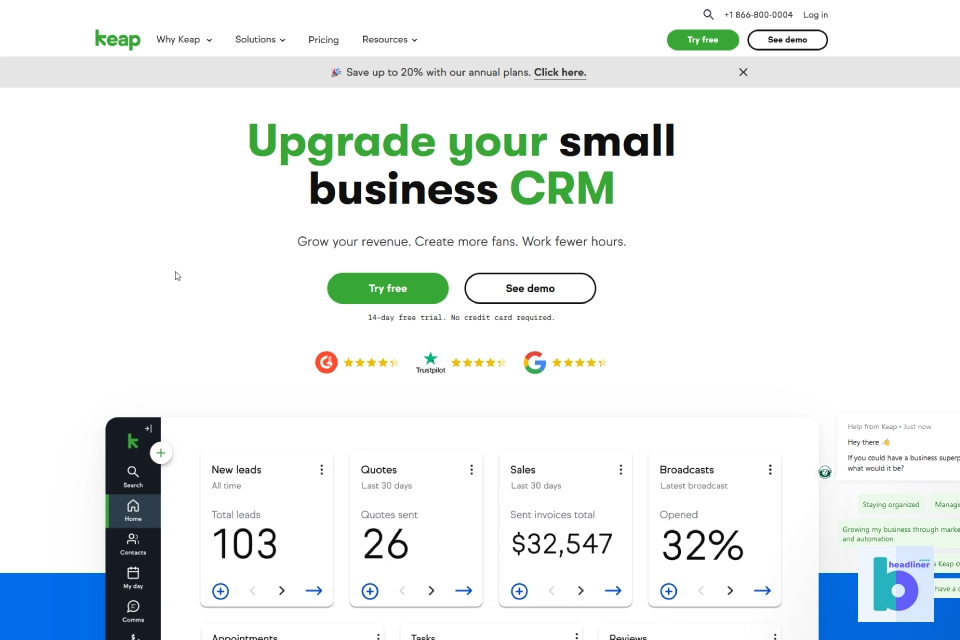
One of the key strengths of Keap is its focus on simplicity and ease of use. The platform offers a user-friendly interface and intuitive workflows, making it accessible for small business owners who may not have extensive technical expertise. Keap allows users to automate personalized email marketing campaigns, create custom landing pages, and track customer interactions, all within a single, centralized system.
Keap enables businesses to improve customer engagement and loyalty through targeted marketing automation. The platform provides tools for segmenting contacts based on their behavior and demographics, allowing businesses to deliver tailored content and offers to the right audience at the right time. By automating follow-ups and personalized communications, Keap helps businesses build stronger relationships with their customers and drive repeat business.
Keap offers robust reporting and analytics capabilities to track campaign performance, measure key metrics, and make data-driven decisions. The platform provides insights into open rates, click-through rates, conversion rates, and revenue generated, enabling businesses to optimize their marketing strategies and achieve better results.
5 best project management software tools
11. Wrike
Wrike is a leading project management software solution that enables teams and organizations to streamline their workflows, collaborate effectively, and achieve project success. With its robust set of features and intuitive interface, Wrike helps teams stay organized, prioritize tasks, and track progress in real-time. The platform offers tools for task management, project planning, document collaboration, time tracking, and reporting, providing a comprehensive solution for project management needs.
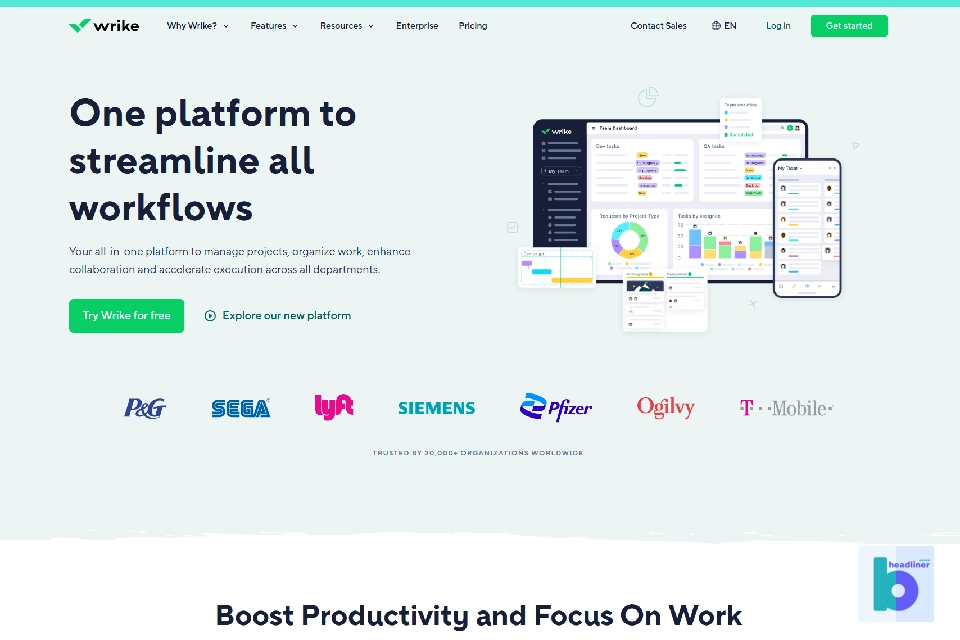
One of the key strengths of Wrike is its flexibility and scalability. The software can be tailored to fit different project management methodologies and team structures, making it suitable for a wide range of industries and project types. Wrike allows users to create customizable workflows, assign tasks to team members, set deadlines, and track dependencies, ensuring that projects stay on track and deliverables are met efficiently.
Wrike facilitates seamless collaboration and communication among team members. The platform offers features such as shared workspaces, task comments, file sharing, and @mentions, enabling teams to collaborate in real-time and keep everyone informed. Wrike also integrates with popular communication tools and email clients, ensuring that team members can stay connected and access project updates from their preferred channels.
Wrike provides comprehensive reporting and analytics capabilities, allowing project managers to track project performance, identify bottlenecks, and make data-driven decisions. The platform offers customizable dashboards, Gantt charts, and workload views, providing insights into project progress, resource allocation, and team productivity. With these features, Wrike empowers organizations to optimize their project management processes, improve efficiency, and deliver successful outcomes.
12. Asana
Asana is a popular project management software that empowers teams to collaborate, organize tasks, and track project progress efficiently. With its user-friendly interface and comprehensive features, Asana helps teams streamline their workflows, prioritize tasks, and stay focused on project goals. The platform offers tools for task management, project planning, file sharing, communication, and reporting, providing a centralized hub for teams to work together effectively.
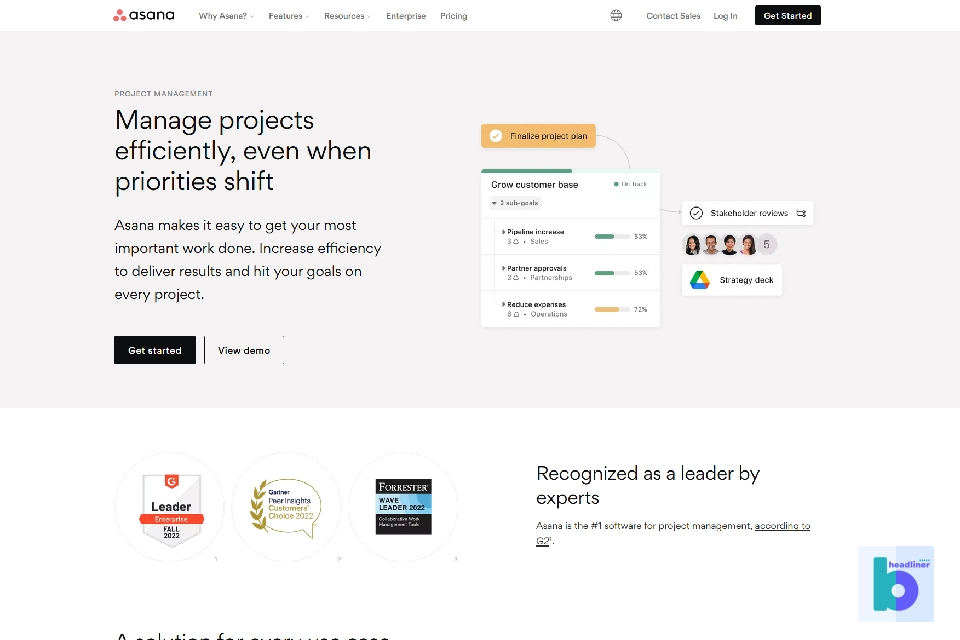
One of the key strengths of Asana is its emphasis on visual project management. The software allows users to create tasks, assign them to team members, set due dates, and track progress using visual boards, lists, or timelines. This visual representation of tasks and their status helps teams gain a clear overview of project progress and identify potential bottlenecks or areas that need attention.
Asana promotes seamless collaboration and communication among team members. Users can easily share files, comment on tasks, and tag colleagues, enabling real-time collaboration and ensuring everyone is on the same page. Asana also integrates with popular communication tools, enhancing team communication and providing a unified platform for project-related discussions.
Asana provides powerful reporting and analytics features that allow teams to track project performance, monitor task completion rates, and gain insights into team productivity. The platform offers customizable dashboards, progress reports, and workload views, enabling project managers to make data-driven decisions and optimize resource allocation.
13. Trello
Trello is a popular project management and collaboration tool that allows teams to visually organize and track their tasks and projects. With its simple and intuitive interface, Trello provides a user-friendly platform for teams to stay organized, prioritize tasks, and collaborate effectively. The software utilizes a board and card system, where users can create lists representing different stages of a project, and within each list, create cards representing individual tasks or assignments.
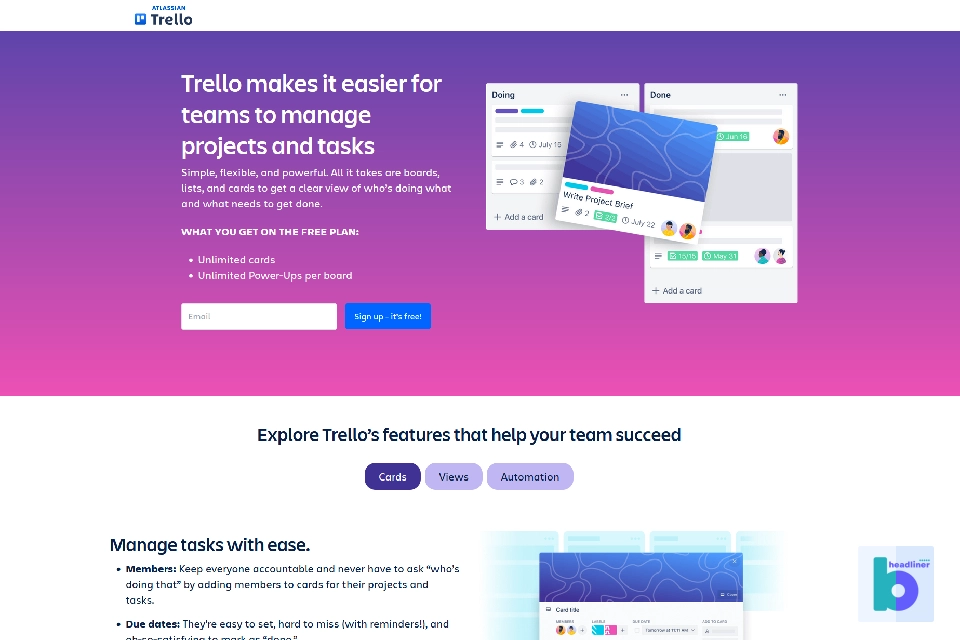
One of the key strengths of Trello is its simplicity and ease of use. The visual nature of boards and cards makes it easy for teams to understand the project’s progress at a glance. Users can move cards across lists to represent their progress, assign team members to specific tasks, set due dates, and add comments or attachments, allowing for seamless collaboration and communication.
Trello offers customization options, allowing teams to adapt the tool to their specific workflows and processes. Users can create custom labels, add checklists, and integrate with various third-party applications to enhance Trello’s functionality and integrate it into their existing toolset.
Trello provides flexibility and scalability, making it suitable for teams of all sizes and industries. Whether managing personal to-do lists or coordinating complex projects across multiple departments, Trello’s simplicity and versatility make it a valuable tool for organizing and tracking tasks.
14. Jira
Jira is a powerful project management and issue tracking software that is widely used by development teams to plan, track, and manage their projects and tasks effectively. Developed by Atlassian, Jira offers a robust set of features and tools that enable teams to streamline their workflows, collaborate seamlessly, and deliver high-quality results. The software is especially popular in the software development industry, but it can be adapted to various project management needs.
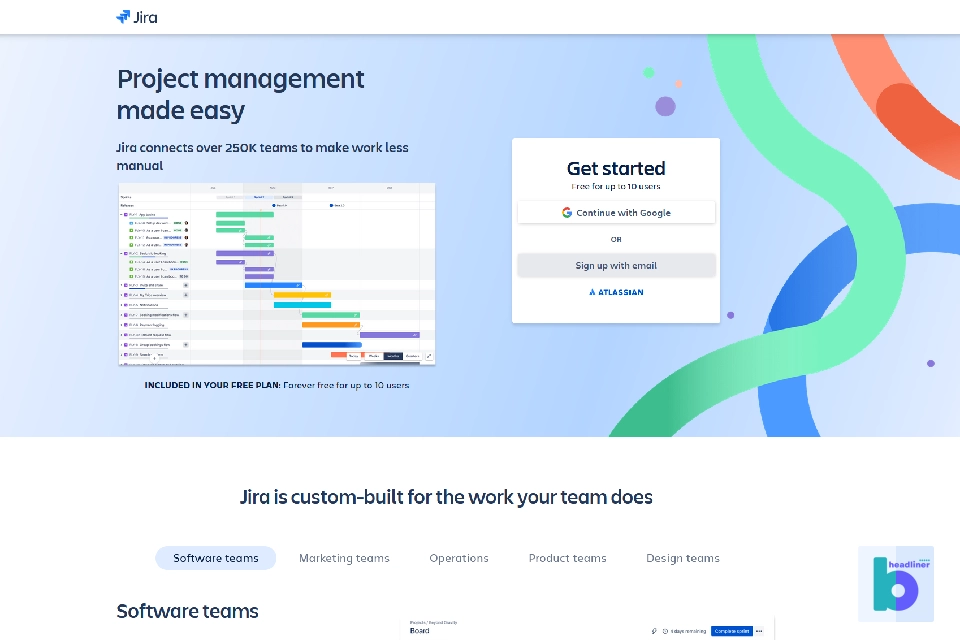
One of the key strengths of Jira is its flexibility and customization capabilities. It allows teams to create and manage projects using different methodologies such as Scrum or Kanban, and customize workflows, issue types, and fields to align with their specific requirements. This adaptability enables teams to tailor Jira to their unique project management processes and increase their efficiency.
Jira provides comprehensive issue tracking and management features. Teams can create and assign tasks, set priorities, track progress, and monitor issue resolution in real-time. The software offers customizable dashboards, agile boards, and advanced reporting capabilities, allowing teams to gain insights into their project status, identify bottlenecks, and make data-driven decisions to improve their performance.
Jira promotes collaboration and transparency within teams. It enables team members to communicate, share files, and provide feedback on tasks and issues. Jira integrates with various communication and collaboration tools, ensuring seamless integration with existing workflows and enhancing teamwork.
15. Microsoft Project
Microsoft Project is a comprehensive project management software that enables teams and organizations to plan, execute, and track projects efficiently. Developed by Microsoft, this powerful tool provides a range of features and functionalities to help project managers and teams stay organized and deliver successful outcomes. With Microsoft Project, users can create project schedules, define tasks, allocate resources, track progress, and manage budgets.
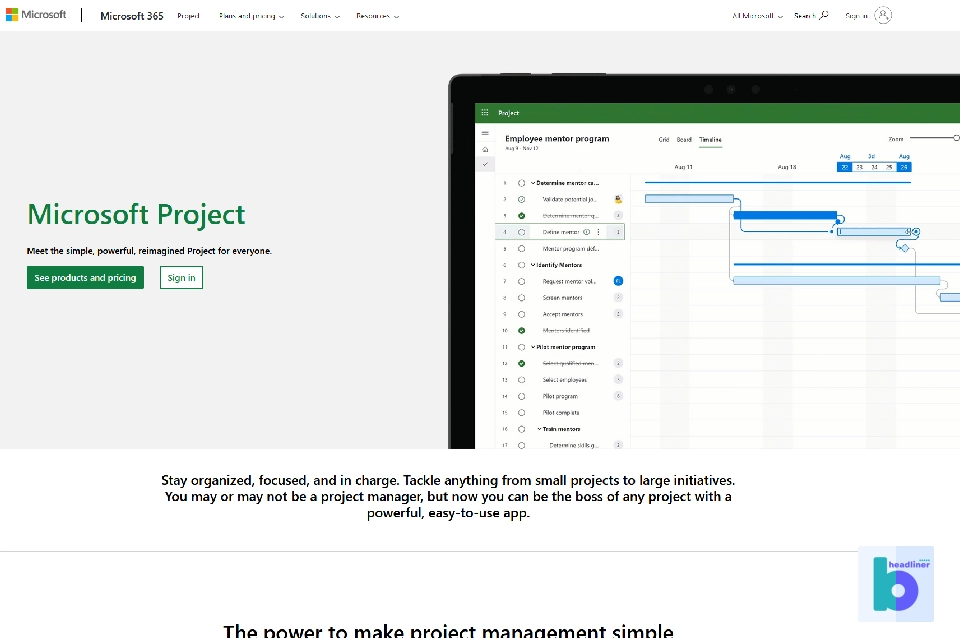
One of the key strengths of Microsoft Project is its extensive set of planning and scheduling tools. The software allows users to define project tasks, set dependencies, and create timelines using Gantt charts or other visualization options. This helps teams establish clear project plans, identify critical path activities, and effectively allocate resources to ensure timely completion.
Microsoft Project offers robust resource management capabilities. Users can assign resources to tasks, track their availability, and manage workload distribution. The software provides insights into resource allocation, allowing project managers to optimize resource utilization and avoid over- or under-allocating resources.
Microsoft Project facilitates collaboration and communication among team members. It integrates with other Microsoft Office tools, such as Outlook and SharePoint, enabling seamless sharing of project information, documents, and updates. Teams can also collaborate in real-time, providing visibility and fostering effective communication and coordination.
Microsoft Project provides comprehensive reporting and analysis features. Users can generate project reports, track progress against key performance indicators (KPIs), and perform what-if analyses to evaluate different scenarios and make informed decisions. These insights enable project managers to identify risks, monitor project health, and take proactive measures to ensure project success.
5 best accounting software tools
16. Xero
Xero is a leading cloud-based accounting software that provides businesses with comprehensive tools to manage their financial processes efficiently. Designed for small to medium-sized businesses, Xero offers a user-friendly interface and a wide range of features that simplify accounting tasks and provide real-time financial insights. With Xero, users can perform key accounting functions such as invoicing, bank reconciliation, expense tracking, and financial reporting.
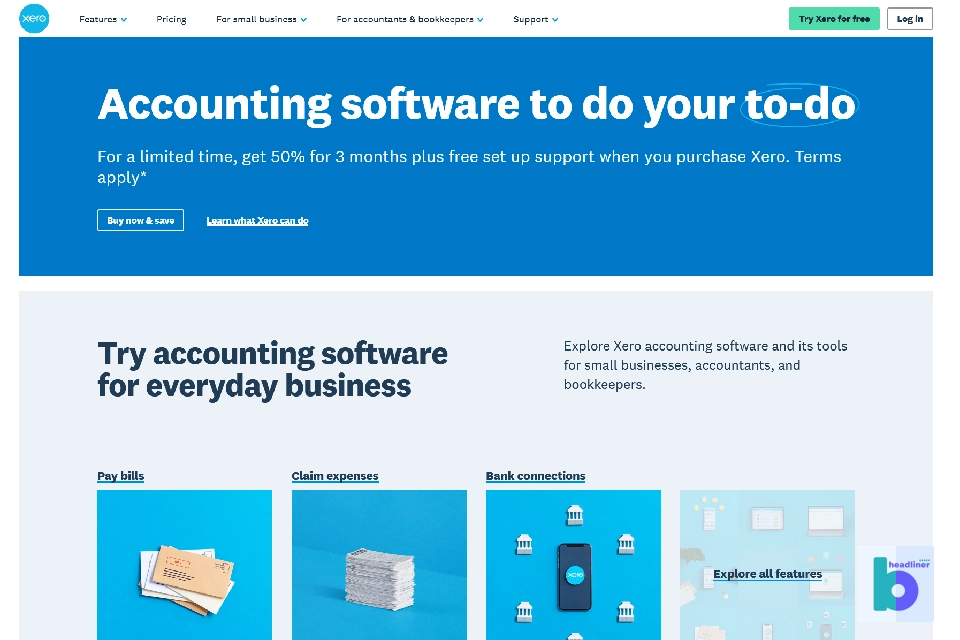
One of the key strengths of Xero is its accessibility and ease of use. As a cloud-based solution, users can access their financial data anytime, anywhere, and from any device with an internet connection. The intuitive interface and streamlined workflows make it easy for users, even those without extensive accounting knowledge, to navigate the software and perform their accounting tasks efficiently.
Xero simplifies the process of managing invoicing and cash flow. Users can easily create and send professional-looking invoices, track payment statuses, and set up automatic payment reminders. The software also integrates with popular payment gateways, enabling businesses to accept online payments conveniently.
Xero offers powerful bank reconciliation capabilities. The software connects directly to users’ bank accounts, automatically importing and categorizing bank transactions. This streamlines the reconciliation process, saves time, and ensures accurate financial data.
Xero provides robust reporting and analytics features that allow businesses to gain insights into their financial health. Users can generate customizable reports, track key performance indicators (KPIs), and monitor cash flow and profitability. These insights help businesses make informed decisions, identify opportunities for growth, and effectively manage their finances.
17. FreshBooks
FreshBooks is a cloud-based accounting software designed for small businesses and freelancers to simplify their financial management processes. With its intuitive interface and user-friendly features, FreshBooks allows users to easily create and send professional invoices, track expenses, manage projects, and generate financial reports. The software provides a range of functionalities to streamline accounting tasks, making it a popular choice for businesses looking for a hassle-free solution.
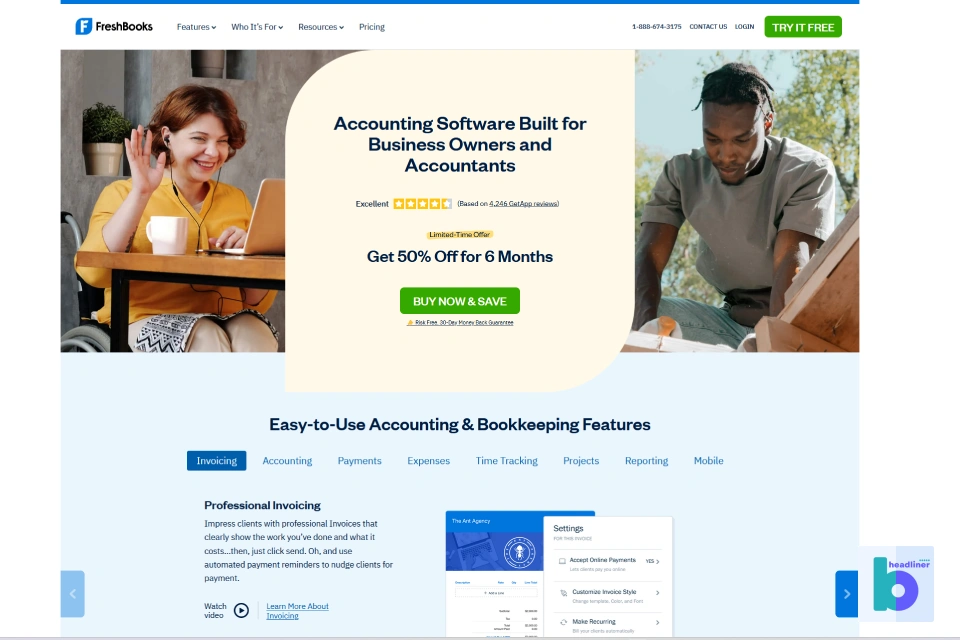
One of the key strengths of FreshBooks is its invoicing capabilities. Users can customize and send branded invoices to clients, track payment statuses, and set up automatic payment reminders. The platform also enables online payment acceptance, making it convenient for clients to pay invoices online, leading to faster payment cycles and improved cash flow.
FreshBooks offers robust expense tracking features. Users can easily capture and categorize expenses, track receipts, and record billable expenses. The software provides a clear overview of business expenses, allowing for better expense management and accurate financial reporting.
FreshBooks simplifies project management by enabling users to create and manage projects, track time spent on tasks, and generate project-specific reports. This functionality is particularly beneficial for businesses that bill clients based on project hours or need to track project profitability.
FreshBooks provides detailed financial reporting capabilities, including profit and loss statements, balance sheets, and expense reports. These reports offer valuable insights into business performance, helping users make informed decisions and identify areas for improvement.
18. QuickBooks
QuickBooks is a popular and widely used accounting software that provides comprehensive financial management solutions for businesses of all sizes. Developed by Intuit, QuickBooks offers a range of features and functionalities to streamline accounting tasks, including invoicing, expense tracking, payroll management, and financial reporting. With its user-friendly interface and robust capabilities, QuickBooks has become a go-to choice for businesses seeking efficient and reliable accounting software.
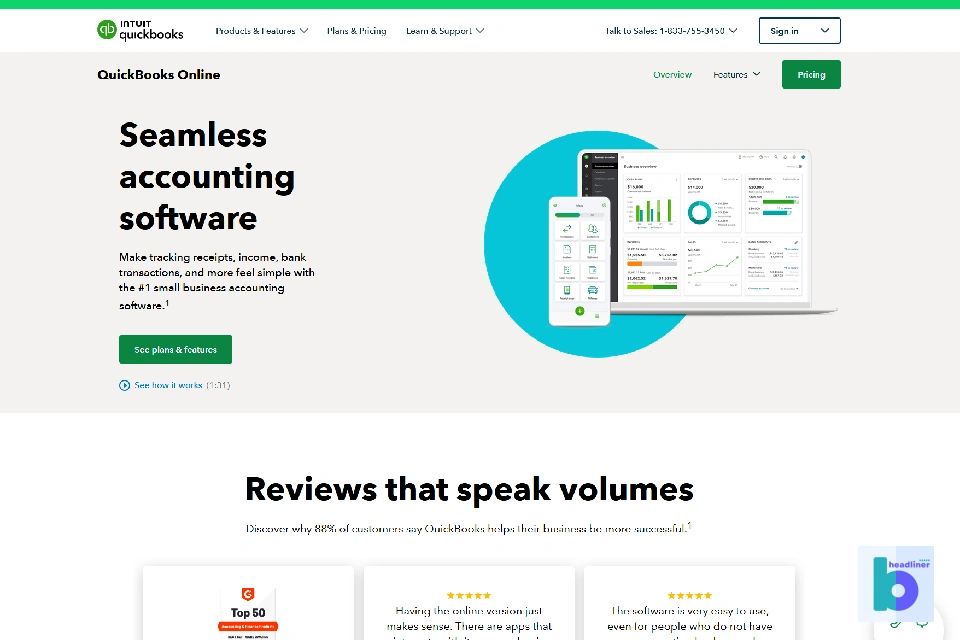
One of the key strengths of QuickBooks is its ease of use and accessibility. The software offers a user-friendly interface that allows users, even those without accounting expertise, to navigate and perform accounting tasks with ease. Additionally, QuickBooks provides both desktop and cloud-based versions, enabling users to access their financial data anytime, anywhere, and from any device with an internet connection.
QuickBooks simplifies the invoicing process by allowing users to create customized invoices, track payment statuses, and automate recurring invoices. The software also integrates with popular payment gateways, making it convenient for businesses to accept online payments.
QuickBooks offers robust expense tracking features, allowing users to record and categorize expenses, track receipts, and manage vendor payments. The software also supports bank feeds, automatically importing and categorizing bank transactions, reducing manual data entry and ensuring accurate financial records.
QuickBooks provides comprehensive financial reporting capabilities, allowing users to generate customizable reports such as profit and loss statements, balance sheets, and cash flow statements. These reports offer valuable insights into business performance, enabling users to make informed decisions and monitor financial health effectively.
19. Wave
Wave is a free, cloud-based accounting software designed for small businesses and freelancers. It offers a range of financial management tools, including invoicing, expense tracking, accounting, and receipt scanning. Wave stands out for its affordability and user-friendly interface, making it an attractive choice for individuals and businesses looking for a cost-effective accounting solution.
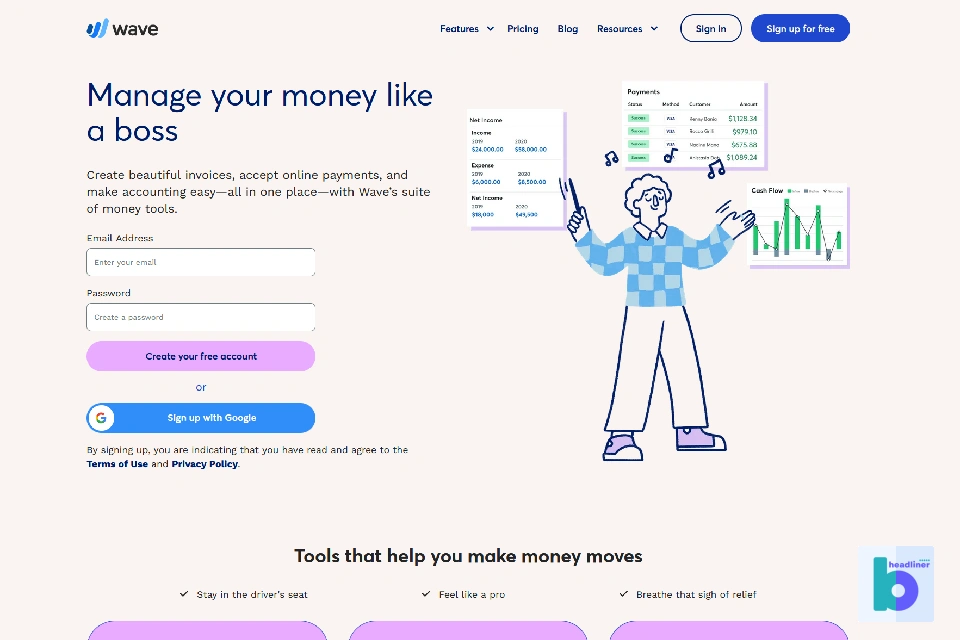
One of the key advantages of Wave is its invoicing feature. Users can easily create and customize professional invoices, track payment statuses, and send automated reminders to clients. The software also supports online payments, enabling businesses to accept credit card payments directly from their invoices, improving cash flow and reducing the hassle of manual payment processing.
Wave simplifies expense tracking by allowing users to upload receipts, categorize expenses, and track spending. The software integrates with bank accounts, automatically importing transactions and reconciling them with the corresponding expenses, reducing manual data entry and improving accuracy.
Wave offers basic accounting functionalities, including general ledger management, balance sheet generation, and financial statement reporting. While not as robust as some other accounting software, Wave provides essential tools for maintaining accurate financial records and generating basic financial reports.
Wave provides easy access to key financial insights with its dashboard and reporting features. Users can view real-time financial data, track income and expenses, and gain insights into their business performance. This enables users to make informed decisions and monitor their financial health effectively.
20. Sage Group
Sage Group is a leading global provider of business management software and services, specializing in solutions for small and medium-sized enterprises (SMEs). With a rich history spanning several decades, Sage has established itself as a trusted and reliable partner for businesses seeking efficient and comprehensive software solutions. The company offers a wide range of products tailored to various business needs, including accounting, payroll, customer relationship management (CRM), and enterprise resource planning (ERP).

One of the key strengths of Sage Group is its commitment to innovation and technology advancements. Sage continuously develops and updates its software solutions to stay at the forefront of industry trends and meet evolving business requirements. This ensures that businesses can leverage the latest tools and functionalities to optimize their operations, streamline processes, and drive growth.
Sage focuses on providing flexible and scalable solutions that can adapt to the changing needs of businesses. Its software offerings cater to businesses of all sizes and industries, from small startups to large enterprises. Sage understands that businesses have unique requirements and aims to provide tailored solutions that align with their specific goals and challenges.
Sage Group emphasizes customer support and services. The company offers training, implementation assistance, and ongoing technical support to ensure a smooth adoption and efficient usage of their software solutions. This commitment to customer success has earned Sage a reputation for delivering exceptional customer service and fostering long-term partnerships with their clients.
5 best HRMS software tools
21. BambooHR
BambooHR is a cloud-based human resources management software that provides organizations with a comprehensive set of tools to streamline and automate their HR processes. Designed to simplify HR tasks and improve employee management, BambooHR offers features such as employee onboarding, time-off tracking, performance management, and applicant tracking. With its intuitive interface and user-friendly design, BambooHR caters to businesses of all sizes, from small startups to large enterprises.

One of the key strengths of BambooHR is its emphasis on employee self-service and empowerment. The software enables employees to access their own HR information, update personal details, request time off, and view company policies and documents. This self-service capability reduces administrative burdens on HR teams and empowers employees to take ownership of their HR-related tasks, enhancing efficiency and engagement.
BambooHR simplifies the hiring process with its applicant tracking system (ATS). Users can create job listings, track applicants, and manage the recruitment process from start to finish. The ATS streamlines candidate evaluation, interview scheduling, and communication, enabling HR teams to efficiently manage and select the best candidates for their organization.
BambooHR offers performance management tools to facilitate ongoing feedback and performance reviews. Users can set goals, conduct performance evaluations, and provide continuous feedback to employees. The software promotes a culture of transparency and growth, allowing managers and employees to track progress, identify development opportunities, and align individual goals with organizational objectives.
BambooHR provides comprehensive reporting and analytics features. Users can generate customized reports on employee data, performance metrics, time-off balances, and more. These insights help HR professionals and business leaders make data-driven decisions, identify trends, and gain a deeper understanding of their workforce.
22. Workday
Workday is a leading cloud-based human capital management (HCM) and financial management software provider. Designed for medium to large enterprises, Workday offers a unified platform that integrates various HR and finance functions, enabling organizations to streamline their operations and make data-driven decisions. The software encompasses a wide range of modules, including HR management, talent acquisition, payroll, time tracking, expense management, and financial planning.

One of the key strengths of Workday is its user-friendly interface and intuitive design. The software provides a modern and visually appealing user experience, making it easy for employees and managers to navigate and perform their tasks efficiently. With its mobile-friendly capabilities, Workday allows users to access HR and financial information on the go, providing flexibility and convenience.
Workday offers robust analytics and reporting capabilities. The software leverages advanced data analytics and machine learning algorithms to provide organizations with actionable insights and predictive analytics.
Users can generate customizable reports and dashboards, enabling them to monitor key performance indicators, track workforce trends, and make informed decisions. The analytics functionality of Workday helps organizations optimize their HR and financial strategies, improve operational efficiency, and drive business growth.
23. ADP
ADP (Automatic Data Processing) is a global leader in providing comprehensive human capital management (HCM) solutions and payroll services to businesses of all sizes. With a rich history and decades of experience in the industry, ADP offers a range of cloud-based software solutions and services that help organizations streamline their HR processes, manage payroll, and navigate complex compliance requirements. ADP’s offerings include payroll processing, time and attendance management, benefits administration, talent management, and HR analytics.
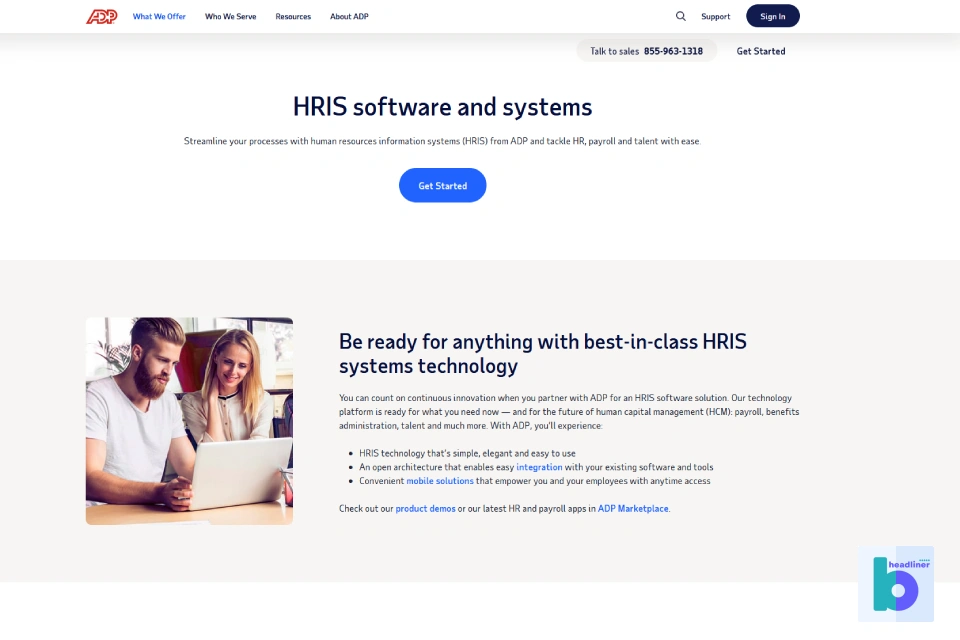
One of the key strengths of ADP is its ability to handle complex payroll processes efficiently. ADP’s payroll services encompass a wide range of functionalities, from calculating wages and deductions to managing tax withholdings and generating pay statements. With their extensive experience and expertise, ADP ensures accuracy, compliance, and timely payroll processing, saving businesses time and effort in managing payroll-related tasks.
ADP provides a holistic suite of HR management solutions that help organizations effectively manage their workforce. From talent acquisition and onboarding to performance management and training, ADP offers tools and features to support the entire employee lifecycle.
These solutions enable businesses to attract top talent, enhance employee engagement, and develop a high-performing workforce. ADP’s HR analytics capabilities further provide valuable insights into workforce trends, helping organizations make data-driven decisions to optimize their HR strategies and drive business success.
24. SAP Success Factors
SAP SuccessFactors is a cloud-based human capital management (HCM) software that helps businesses manage their workforce and optimize their talent management strategies.
As a part of the larger SAP suite of enterprise software solutions, SAP SuccessFactors offers a range of modules and functionalities, including talent acquisition, performance management, learning and development, compensation management, and employee engagement. The software provides a unified platform that enables organizations to attract, develop, and retain top talent while aligning their workforce with strategic goals.
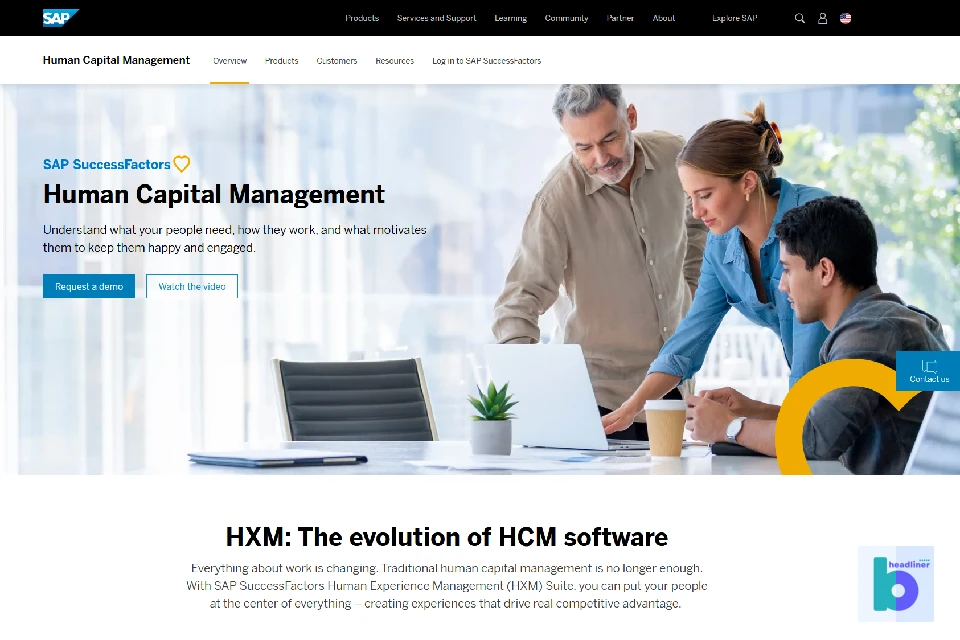
One of the key strengths of SAP SuccessFactors is its robust talent management capabilities. The software offers comprehensive features for talent acquisition, allowing businesses to streamline their recruitment processes, manage candidate profiles, and automate hiring workflows.
With performance management functionalities, SAP SuccessFactors enables organizations to set goals, track performance, provide ongoing feedback, and conduct performance appraisals, facilitating a culture of continuous development and performance improvement.
SAP SuccessFactors provides extensive learning and development tools to enhance employee skills and knowledge. The software enables organizations to deliver personalized training programs, manage certifications, and track employee progress.
With its advanced analytics capabilities, SAP SuccessFactors also offers insights into employee engagement, career development, and succession planning, empowering businesses to make data-driven decisions and optimize their talent strategies.
25. Zenefits
Zenefits is a cloud-based human resources (HR) software platform that provides businesses with a comprehensive suite of tools to manage their HR processes efficiently. Designed with small and medium-sized businesses in mind, Zenefits offers functionalities such as benefits administration, payroll management, time and attendance tracking, employee onboarding, and compliance management. The platform aims to streamline HR operations and empower businesses to focus on their core activities while ensuring compliance with legal and regulatory requirements.
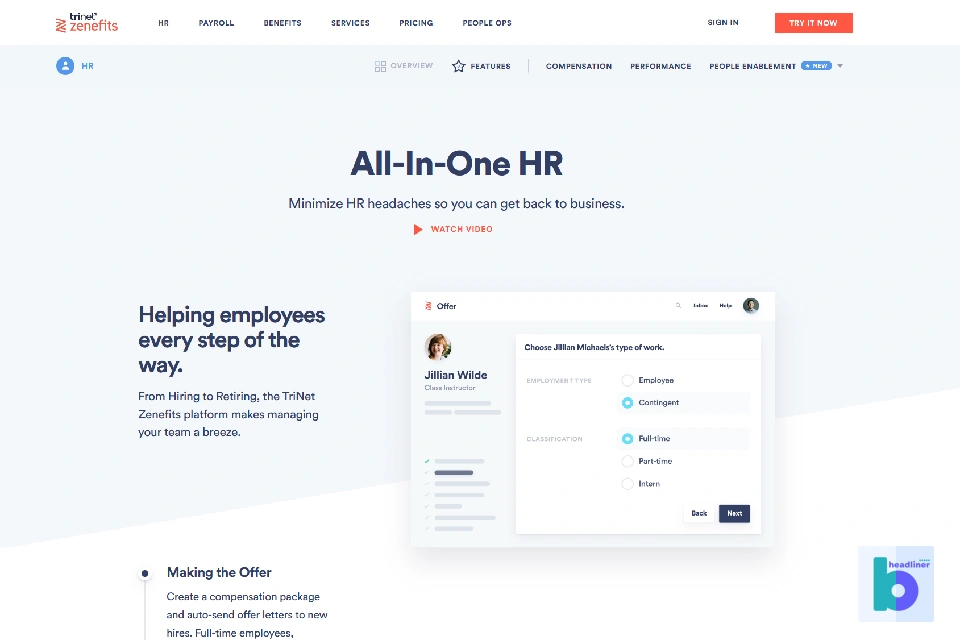
One of the key strengths of Zenefits is its integrated approach to HR management. The platform centralizes various HR functions into a single, user-friendly interface, allowing businesses to automate and streamline their HR processes.
With Zenefits, employers can manage employee benefits, including health insurance, retirement plans, and flexible spending accounts, all within the same system. This integration not only saves time but also reduces the chances of errors and ensures accurate and consistent data across different HR functions.
Zenefits offers a self-service portal that empowers employees to manage their own HR-related tasks. Employees can access the platform to update personal information, request time off, view their pay stubs, and enroll in benefits.
This self-service feature reduces administrative burdens on HR teams and improves employee satisfaction by providing easy access to important HR information. Additionally, Zenefits provides HR analytics and reporting capabilities, allowing businesses to gain insights into their workforce data, monitor trends, and make data-driven decisions to optimize their HR strategies.
5 best business intelligence and analytics software tools
26. Tableau
Tableau is a leading data visualization and business intelligence software that empowers organizations to transform complex data into meaningful insights. With its intuitive drag-and-drop interface and powerful analytics capabilities, Tableau allows users to easily create interactive visualizations, dashboards, and reports. The software connects to a wide range of data sources, including spreadsheets, databases, and cloud services, enabling users to explore and analyze data from multiple perspectives.
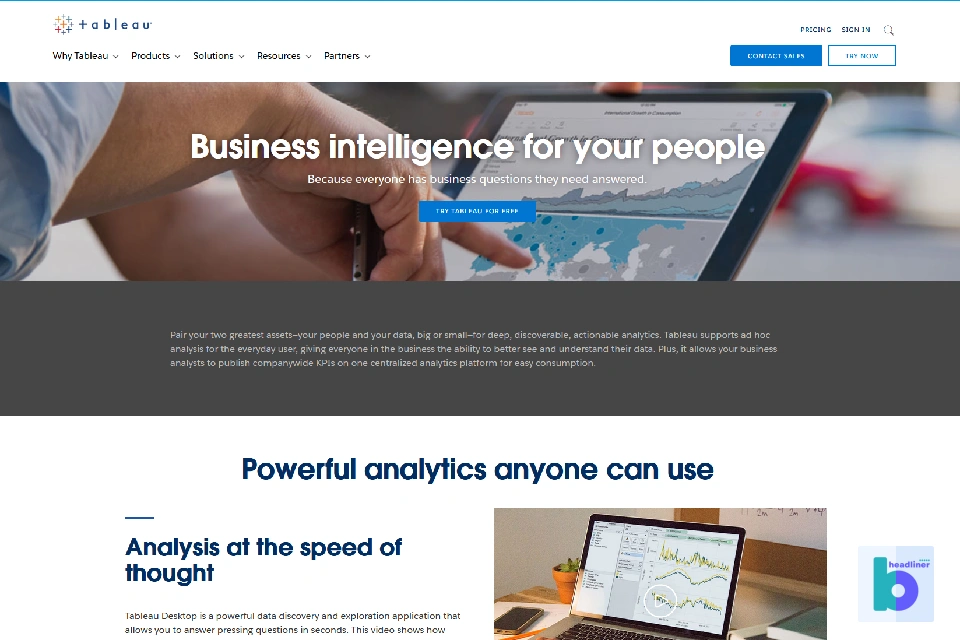
One of the key strengths of Tableau is its ability to present data in a visually compelling and interactive manner. Users can choose from a variety of charts, graphs, and maps to represent their data, making it easier to understand patterns, trends, and relationships.
Tableau’s interactivity allows users to drill down into specific data points, filter information, and create dynamic visualizations that facilitate exploration and discovery. This visual approach to data analysis enables users to communicate insights effectively and make data-driven decisions.
Tableau promotes a self-service analytics culture by providing a user-friendly environment for data exploration and analysis. With Tableau’s intuitive interface and drag-and-drop functionality, users without extensive technical skills or programming knowledge can easily work with data and create impactful visualizations.
This self-service capability reduces the dependence on IT departments and enables users to gain insights and answer business questions on their own, fostering a more agile and data-driven decision-making process within organizations.
27. Qlik
Qlik is a renowned data analytics and visualization platform that enables organizations to explore and analyze their data in a highly interactive and intuitive manner. With its powerful associative engine, Qlik allows users to navigate and connect data from multiple sources, providing a comprehensive view of their business insights.
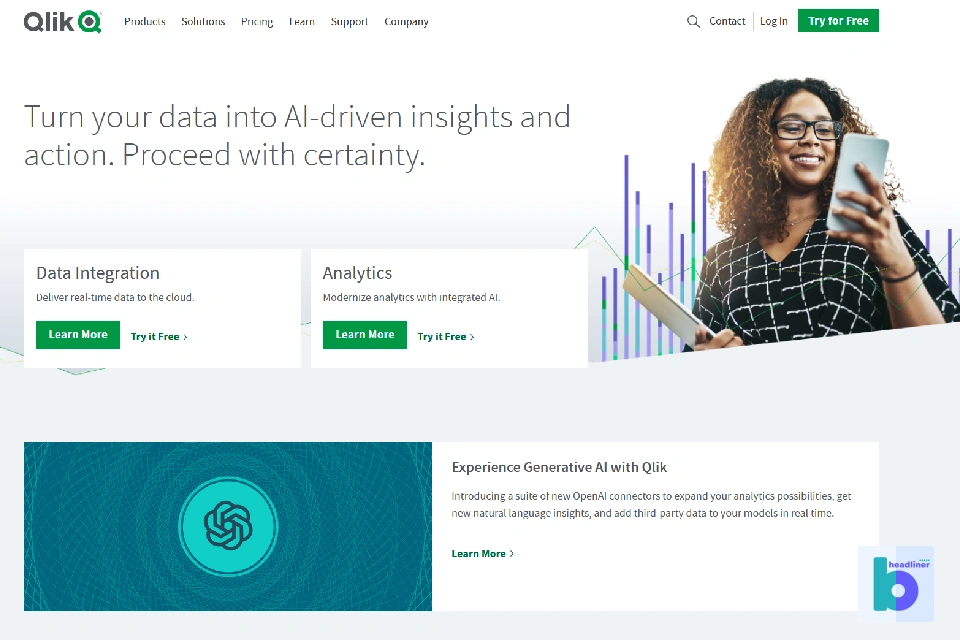
The platform’s unique associative technology enables users to make dynamic associations between different data points, enabling them to explore relationships and uncover hidden patterns and insights that may not be immediately apparent.
One of the key strengths of Qlik is its user-friendly interface and self-service capabilities. Qlik’s intuitive drag-and-drop interface makes it easy for users to create interactive visualizations, dashboards, and reports without the need for extensive technical expertise.
Users can explore their data in real-time, making on-the-fly selections and applying filters to analyze specific data subsets. This self-service approach empowers users across the organization to access and analyze data, enabling them to gain insights and make informed decisions independently.
Qlik provides powerful data discovery and analytics capabilities. With its advanced analytics features, including predictive analytics and statistical modeling, Qlik allows users to go beyond basic data visualization and delve deeper into their data to uncover trends and patterns.
The platform’s built-in data storytelling functionality enables users to create compelling narratives around their data, helping to communicate insights effectively and drive data-driven decision-making across the organization.
28. Looker
Looker is a powerful business intelligence and data analytics platform that helps organizations unlock the value of their data. As a cloud-based solution, Looker enables users to connect to various data sources, transform raw data into meaningful insights, and create interactive dashboards and reports.
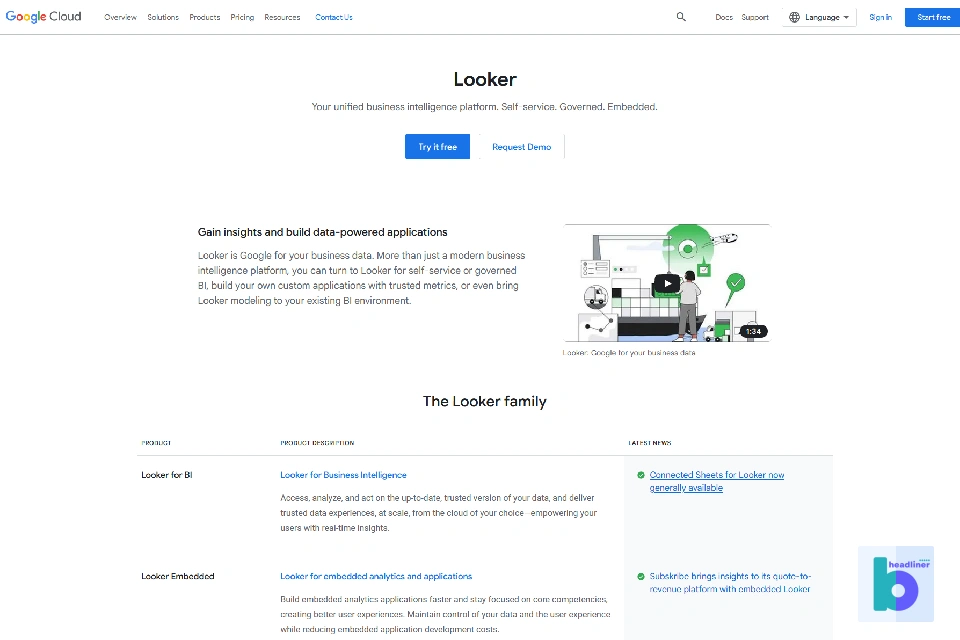
With its user-friendly interface and robust data modeling capabilities, Looker empowers users to explore and visualize data in a way that suits their specific needs, making it an ideal tool for data-driven decision-making.
One of the key strengths of Looker is its data modeling and exploration capabilities. Looker allows users to build a semantic layer, known as LookML, which provides a consistent and centralized view of data across the organization. This allows for easy data exploration and analysis, as users can ask questions in natural language and receive accurate answers based on the underlying data model.
Looker’s exploration features enable users to drill down into specific data points, apply filters, and create custom calculations, providing a deeper understanding of the data and uncovering actionable insights.
Looker promotes collaboration and data sharing within organizations. The platform provides a central hub for sharing dashboards, reports, and data visualizations, ensuring that everyone has access to the most up-to-date information.
29. Sisense
Sisense is a robust business intelligence and analytics platform that empowers organizations to extract actionable insights from complex and large datasets. With its advanced data preparation and visualization capabilities, Sisense enables users to combine and analyze data from multiple sources to gain a comprehensive view of their business performance.
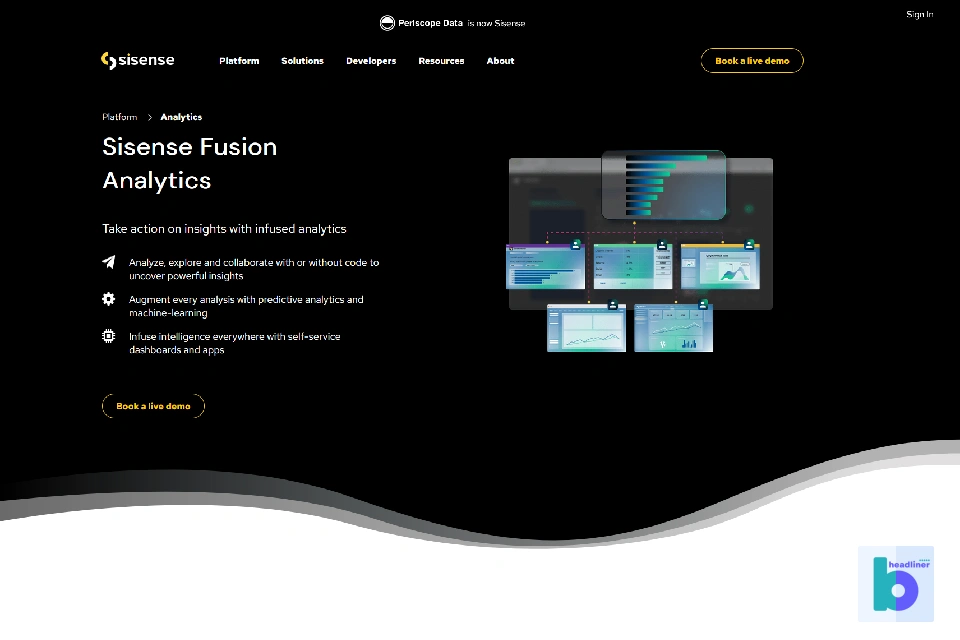
The platform’s powerful in-chip technology and data compression algorithms allow for fast data processing, ensuring that users can explore and analyze data in real-time.
One of the key strengths of Sisense is its ability to handle and transform large volumes of data into meaningful visualizations and reports. Sisense’s data preparation tools provide a seamless experience for data integration, cleansing, and modeling, allowing users to harmonize disparate data sources and create a unified view of their data.
The platform’s drag-and-drop interface and interactive dashboards enable users to visualize data in a visually appealing and intuitive way, facilitating data exploration and enabling stakeholders to uncover insights and trends.
Sisense offers advanced analytics capabilities, including predictive analytics and machine learning, to help organizations gain predictive insights and make data-driven decisions. Users can leverage these advanced analytics features to uncover patterns, detect anomalies, and forecast future trends.
30. Microsoft Power Bi
Microsoft Power BI is a leading business intelligence and data visualization platform that helps organizations turn raw data into meaningful insights.
With its user-friendly interface and powerful analytics capabilities, Power BI enables users to connect to various data sources, transform and clean data, and create interactive visualizations and reports. The platform offers a wide range of pre-built connectors to popular data sources, such as Excel, SQL Server, and cloud-based services, making it easy to integrate and analyze data from multiple systems.

One of the key strengths of Microsoft Power BI is its seamless integration with other Microsoft products and services. Power BI integrates seamlessly with Microsoft Excel, allowing users to leverage their existing Excel skills and data models.
Power BI can be integrated with other Microsoft tools, such as Azure and Office 365, enabling organizations to leverage their existing Microsoft ecosystem and infrastructure. This integration enhances collaboration and data sharing within the organization, making it easier to distribute insights and reports across teams and departments.
Power BI offers robust data visualization capabilities that allow users to create compelling and interactive visualizations to explore data. The platform provides a wide range of visualization options, including charts, graphs, maps, and custom visuals, enabling users to present data in a visually appealing and easy-to-understand manner.
Power BI’s interactive dashboards and reports empower users to drill down into specific data points, apply filters, and perform ad-hoc analysis, facilitating data exploration and enabling stakeholders to uncover valuable insights.
5 best communication and collaboration software tools
31. Slack
Slack is a widely used collaboration and communication platform that revolutionizes the way teams and organizations work together. With its intuitive interface and real-time messaging capabilities, Slack enables users to communicate, share files, and collaborate seamlessly within teams and across departments. The platform provides a centralized hub for team conversations, allowing users to create dedicated channels for specific projects or topics, facilitating efficient communication and information sharing.
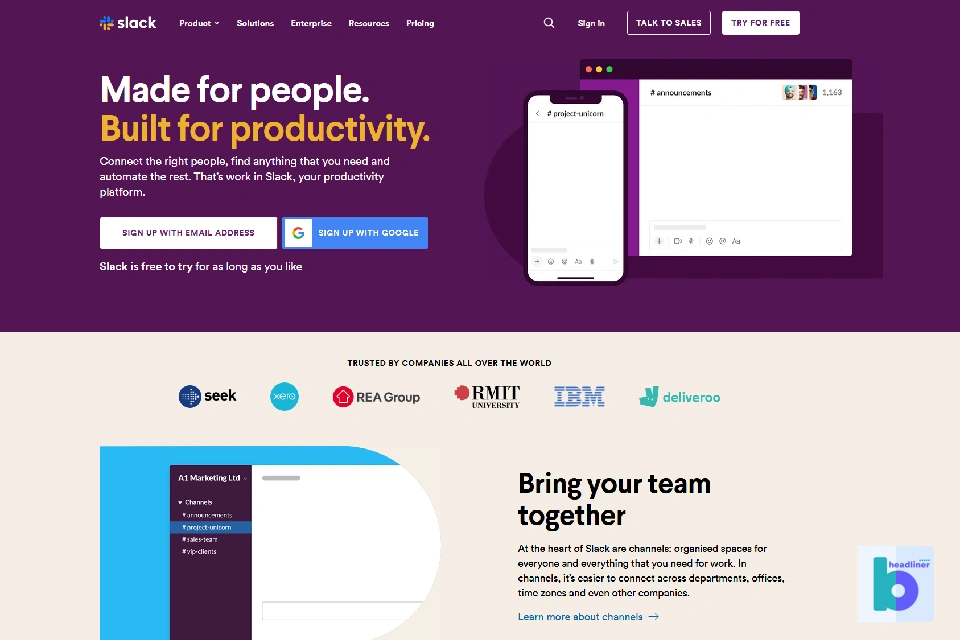
One of the key strengths of Slack is its integration capabilities, allowing users to connect various apps and services to streamline workflows and automate tasks. Slack integrates with a wide range of tools, including project management software, file-sharing services, and productivity apps, enabling users to access and share information from different platforms without leaving the Slack interface. This integration not only enhances collaboration but also improves productivity by reducing the need to switch between multiple applications.
Slack offers a rich set of features that enhance team collaboration and productivity. Users can easily share files, conduct voice and video calls, and even integrate bots and workflows to automate routine tasks. Slack’s search functionality allows users to quickly find past conversations and shared files, making it easy to retrieve important information. Additionally, Slack provides a robust notification system, allowing users to stay updated on important discussions and mentions, ensuring that communication remains efficient and timely.
32. Flock
Flock is a powerful team collaboration and communication platform designed to streamline workplace communication and enhance productivity. With its user-friendly interface and a wide range of features, Flock brings together messaging, file sharing, and collaboration tools into one centralized platform.
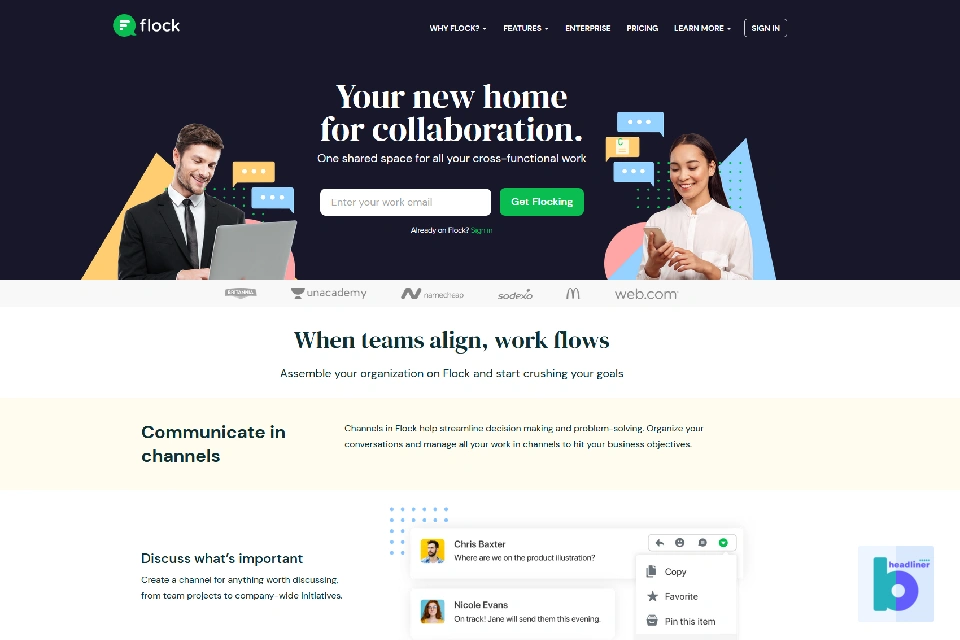
Users can create dedicated channels for teams or projects, facilitating focused discussions and efficient information sharing. Flock also offers real-time messaging, allowing for quick and seamless communication, whether it’s one-on-one or within group conversations.
One of the key strengths of Flock is its extensive integration capabilities. The platform integrates with popular productivity tools and services, such as Google Drive, Trello, and Asana, enabling users to centralize their work and access relevant information without switching between multiple apps.
Flock also supports bots and app integrations, allowing users to automate repetitive tasks and receive updates and notifications from external systems directly within the platform. This integration flexibility enhances productivity and reduces the need for users to juggle multiple tools and platforms.
Flock offers a range of collaboration features to enhance teamwork and project management. Users can create and assign tasks, set reminders, and track progress within the platform. Flock also provides screen sharing and video conferencing capabilities, making it easy for remote teams to collaborate effectively.
33. GoToMeeting
GoToMeeting is a popular web conferencing and online meeting platform that enables individuals and teams to connect and collaborate remotely. With its easy-to-use interface and robust features, GoToMeeting allows users to host virtual meetings, share screens, and conduct video conferences with participants from anywhere in the world.
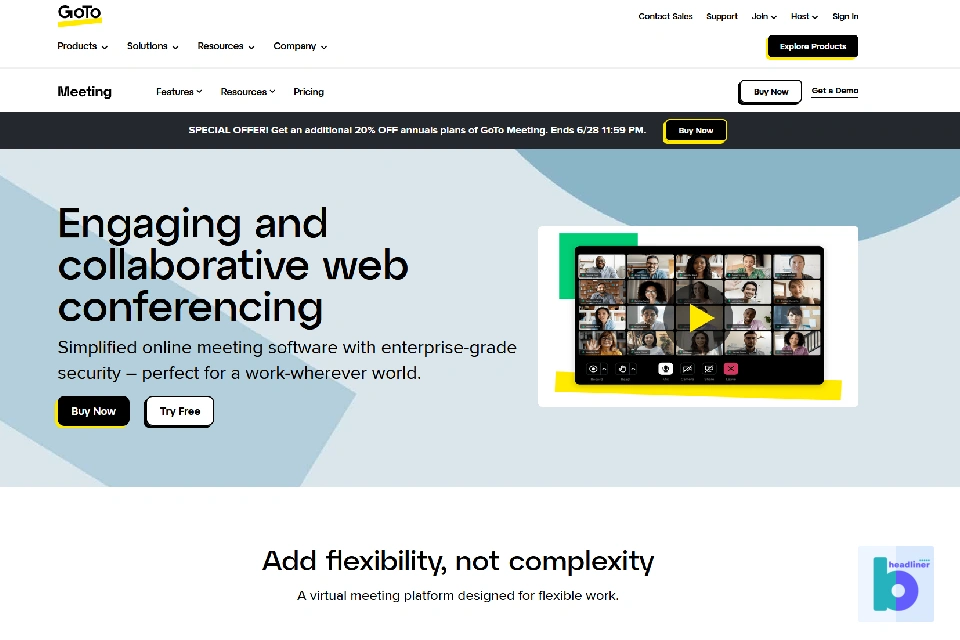
The platform offers a reliable and secure environment for effective communication and collaboration, making it an ideal solution for remote teams, businesses, and educational institutions.
One of the key strengths of GoToMeeting is its versatility and scalability. The platform supports both small team meetings and large-scale webinars, accommodating various collaboration needs. With features like screen sharing, chat functionality, and interactive whiteboarding, GoToMeeting fosters real-time collaboration and engagement among participants.
The platform also provides advanced features such as recording meetings, scheduling recurring meetings, and integrating with popular calendar applications, ensuring seamless coordination and easy access to meeting recordings for future reference.
GoToMeeting offers robust security features to protect the confidentiality of meetings and sensitive information. The platform incorporates encryption and authentication protocols to ensure that meetings are secure and accessible only to authorized participants.
GoToMeeting provides comprehensive administrative controls, allowing hosts to manage attendee permissions, monitor meeting activities, and enforce security settings. This emphasis on security and privacy makes GoToMeeting a trusted choice for organizations that prioritize data protection and secure collaboration.
34. Zoom
Zoom is a widely recognized and highly utilized video conferencing and collaboration platform that has become synonymous with virtual meetings and remote work. With its user-friendly interface and extensive features, Zoom has gained popularity for its ability to facilitate seamless communication and collaboration among individuals and teams. The platform offers high-quality video and audio capabilities, enabling participants to join meetings from various devices and locations, fostering effective communication and connection.
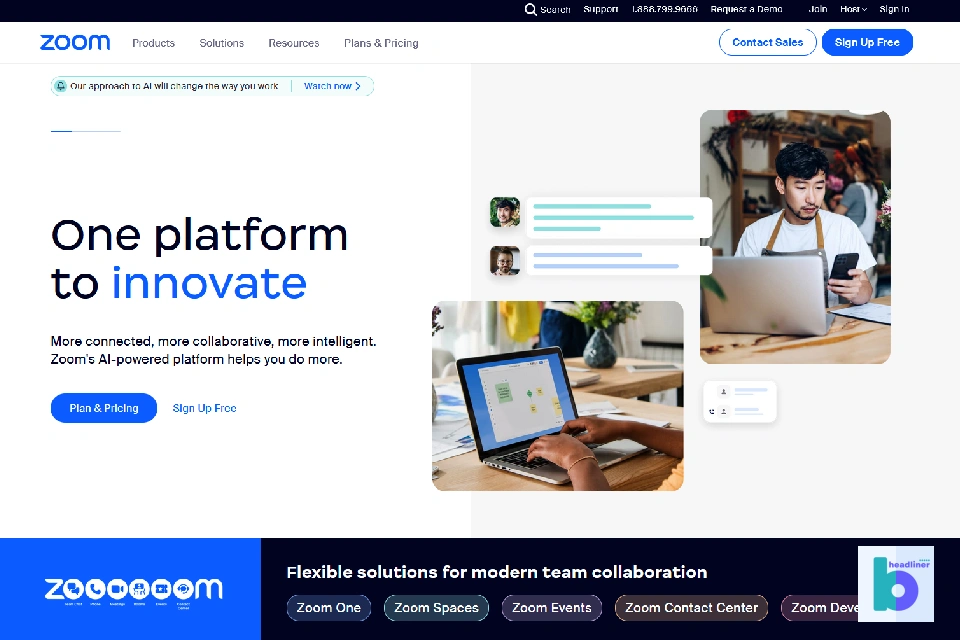
One of the key strengths of Zoom is its scalability and versatility. Whether it’s a small team meeting or a large-scale webinar with hundreds of participants, Zoom can accommodate a wide range of meeting sizes and formats. The platform offers features like screen sharing, virtual backgrounds, breakout rooms, and chat functionality, enhancing collaboration and engagement during meetings. Zoom also supports integrations with popular productivity tools, allowing users to seamlessly incorporate their existing workflows and applications into the Zoom environment.
Zoom provides a reliable and secure environment for online meetings. The platform offers encryption and authentication protocols to protect the privacy and confidentiality of meetings.
Zoom also provides host controls, allowing hosts to manage meeting settings, control participant access, and monitor meeting activities. With its focus on security and privacy, Zoom has implemented various measures to ensure that meetings are conducted securely and that sensitive information remains protected.
35. Skype for Business
Skype for Business, now known as Microsoft Teams, was a widely used communication and collaboration platform that offered a range of features for businesses of all sizes. The platform provided instant messaging, audio and video calling, as well as screen sharing capabilities, enabling teams to communicate and collaborate seamlessly. Skype for Business integrated with other Microsoft Office applications, making it easy to schedule and join meetings directly from Outlook, share files, and collaborate on documents in real-time.
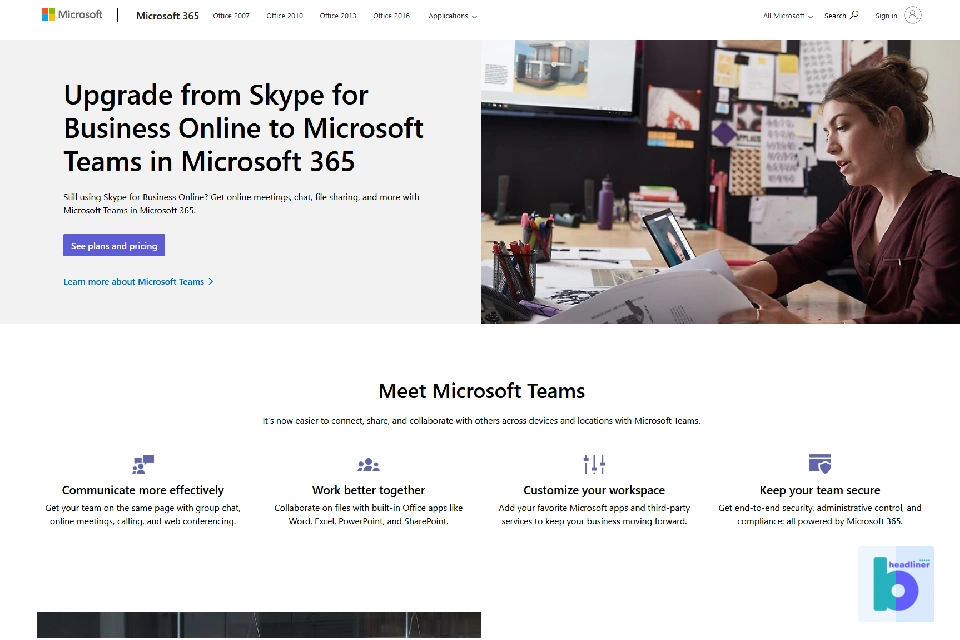
One of the key strengths of Skype for Business was its enterprise-level capabilities. The platform supported large-scale meetings, webinars, and conference calls with hundreds of participants. It offered advanced features like recording meetings, setting up virtual meeting rooms, and managing participant permissions. Skype for Business also provided integration with Skype, allowing users to connect with external contacts and clients who were using the consumer version of Skype, facilitating external communication and collaboration.
Skype for Business emphasized security and compliance, providing encryption for communication and meeting data. The platform integrated with Active Directory, allowing for centralized user management and control over access and permissions.
Organizations could also leverage Microsoft’s enterprise-level security measures, such as multi-factor authentication and data protection, to ensure the confidentiality and privacy of their communication and collaboration within Skype for Business.
5 best marketing automation software tools
36. Marketo
Marketo is a powerful marketing automation platform that helps businesses streamline their marketing efforts, nurture leads, and drive customer engagement. With its comprehensive set of tools and features, Marketo enables marketers to create personalized and targeted marketing campaigns across multiple channels.
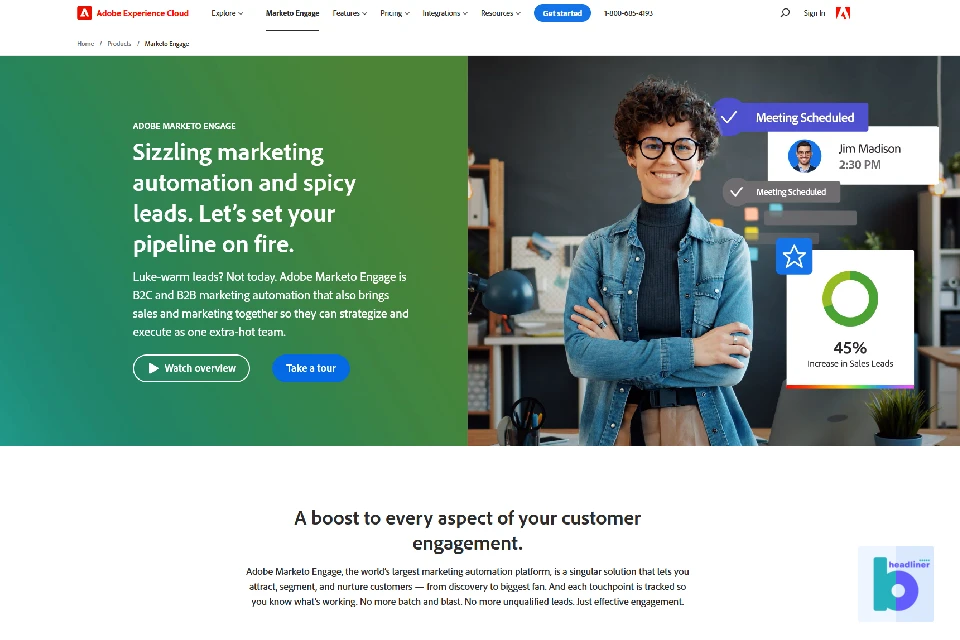
The platform allows users to automate various marketing tasks, such as email marketing, lead scoring, and campaign management, saving time and improving marketing efficiency.
One of the key strengths of Marketo is its robust lead management and nurturing capabilities. The platform provides tools to capture and track leads throughout the customer journey, allowing marketers to understand their audience better and deliver personalized experiences.
Marketo’s lead scoring and nurturing features enable marketers to prioritize and engage with leads based on their level of interest and readiness to make a purchase. By automating these processes, Marketo helps businesses build stronger relationships with their prospects and improve conversion rates.
37. ActiveCampaign
ActiveCampaign is a robust marketing automation platform that enables businesses to automate and optimize their marketing campaigns and customer engagement. With its comprehensive suite of tools, ActiveCampaign allows users to automate email marketing, create personalized customer journeys, and track customer interactions. The platform offers advanced segmentation and tagging capabilities, empowering marketers to deliver targeted and relevant messages to their audience at the right time.
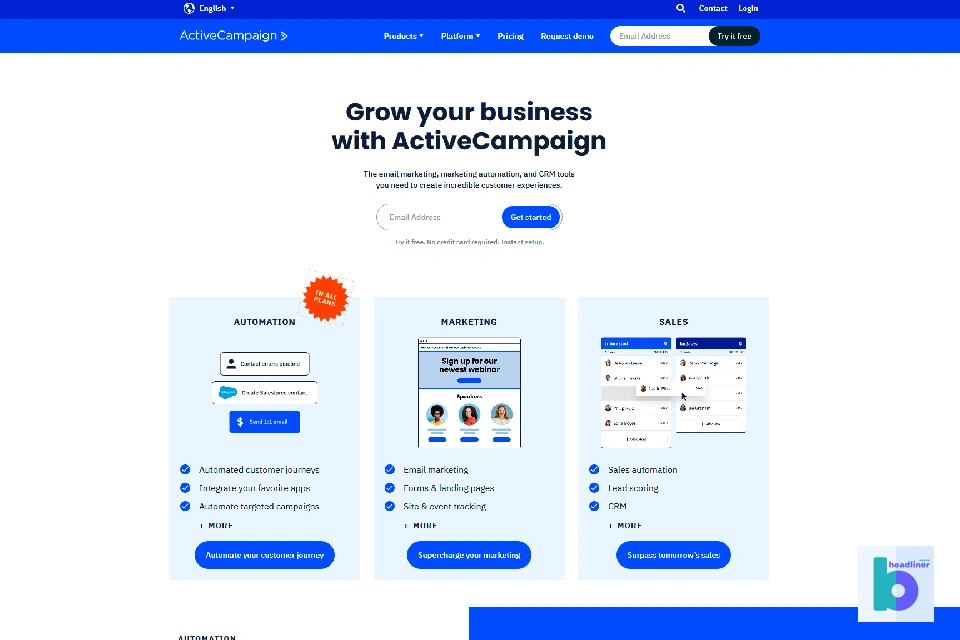
One of the key strengths of ActiveCampaign is its focus on customer relationship management (CRM) functionality. The platform provides a centralized CRM database that stores comprehensive customer profiles, including contact information, communication history, and behavior data.
This holistic view of customers enables businesses to better understand their audience and tailor their marketing efforts accordingly. ActiveCampaign’s CRM features also facilitate effective lead management and sales automation, allowing businesses to track leads, nurture them through automated workflows, and identify high-value opportunities.
ActiveCampaign offers powerful automation capabilities that streamline marketing processes and save time for marketers. The platform allows users to create complex automation workflows based on customer behavior triggers, such as email opens, link clicks, or form submissions.
This automation enables businesses to deliver timely and relevant messages to their audience, increasing engagement and conversion rates. ActiveCampaign also integrates with various third-party applications and offers a robust marketplace of integrations, extending its capabilities and allowing businesses to connect with their favorite tools and platforms.
38. Pardot
Pardot is a comprehensive marketing automation platform offered by Salesforce, designed to help businesses streamline and optimize their marketing efforts. As part of the Salesforce ecosystem, Pardot seamlessly integrates with Salesforce CRM, allowing for seamless data synchronization and a unified view of customer interactions.
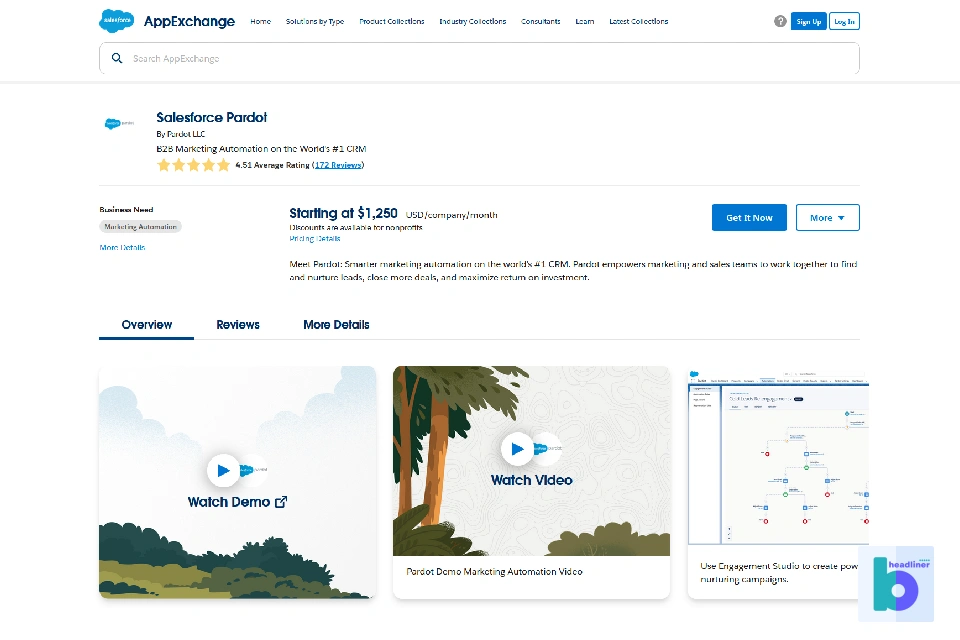
The platform provides a wide range of marketing automation features, including email marketing, lead generation and nurturing, landing page creation, and campaign management, empowering marketers to deliver personalized and targeted experiences to their audience.
One of the key strengths of Pardot is its robust lead management capabilities. The platform offers tools for lead scoring and grading, allowing marketers to prioritize and qualify leads based on their behavior and engagement with marketing assets.
Pardot’s lead nurturing functionality enables marketers to automate personalized drip campaigns, ensuring that leads are engaged and nurtured through the sales funnel. With Pardot, businesses can track and analyze lead behavior, monitor campaign performance, and gain valuable insights into the effectiveness of their marketing efforts.
Pardot provides advanced analytics and reporting features that allow marketers to measure the impact of their campaigns and make data-driven decisions. The platform offers customizable dashboards, reports, and visualizations that provide real-time insights into key marketing metrics, such as email engagement, lead conversions, and campaign ROI.
This data empowers marketers to optimize their marketing strategies, identify areas of improvement, and align their efforts with business goals. With its comprehensive marketing automation and analytics capabilities, Pardot enables businesses to automate marketing processes, generate higher-quality leads, and drive revenue growth.
39. Mailchimp
Mailchimp is a popular email marketing platform that offers a range of tools and features to help businesses effectively manage their email campaigns and engage with their audience. With its user-friendly interface and intuitive drag-and-drop editor, Mailchimp makes it easy for users to create visually appealing and professional-looking email templates.
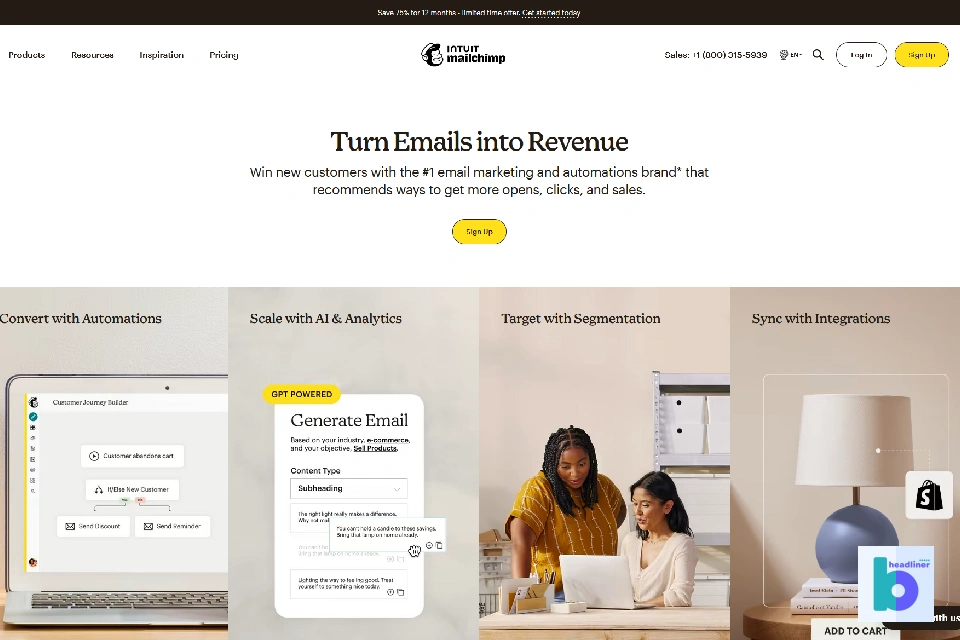
The platform provides various customization options, allowing businesses to personalize their emails and tailor them to specific segments of their audience. Mailchimp also offers automation features, enabling businesses to send targeted and automated email sequences based on customer behavior and preferences.
One of the key strengths of Mailchimp is its robust audience management capabilities. The platform allows businesses to build and manage their email lists, segment their audience based on various criteria, and create personalized email campaigns for each segment. Mailchimp’s segmentation features enable businesses to send highly relevant and targeted messages, improving engagement and conversion rates.
Mailchimp provides analytics and reporting tools that offer insights into email performance, including open rates, click-through rates, and audience engagement. These insights help businesses track the success of their email campaigns, identify areas for improvement, and make data-driven decisions to optimize their marketing efforts.
40. Constant Contact
Constant Contact is a powerful email marketing platform that empowers businesses to create, manage, and optimize their email campaigns with ease. The platform offers a range of user-friendly tools and templates that make it simple to design visually appealing emails that align with a brand’s style and messaging.
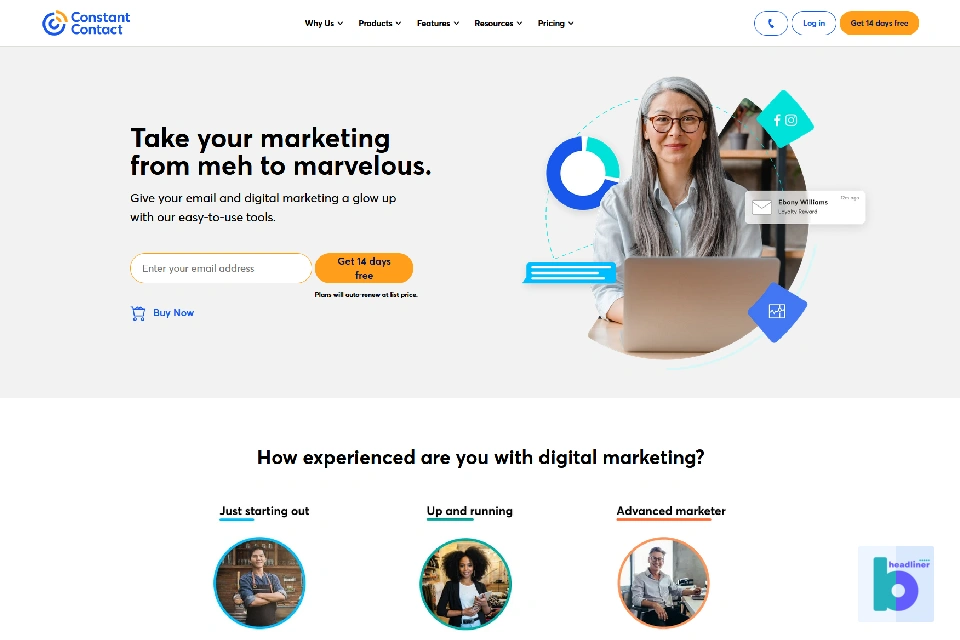
Constant Contact provides features such as drag-and-drop editors, customizable templates, and image libraries, allowing businesses to create professional-looking emails without any coding or design experience. With its intuitive interface, users can easily personalize and segment their email lists to deliver targeted messages that resonate with their audience.
One of the key strengths of Constant Contact is its focus on helping businesses build strong relationships with their subscribers. The platform offers features like automated welcome emails, personalized email series, and contact management tools to engage subscribers throughout their customer journey.
Constant Contact also provides detailed analytics and reporting, giving businesses insights into email open rates, click-through rates, and audience engagement. These insights enable businesses to assess the effectiveness of their campaigns, identify areas for improvement, and make data-driven decisions to optimize their email marketing strategy.
Constant Contact extends beyond email marketing by offering additional features such as event management, social media marketing, and surveys. Users can create event registration pages and manage RSVPs, promoting their events to their email subscribers. The platform also allows businesses to schedule and publish social media posts, extending their reach and enhancing their online presence.
5 best SCM software tools
41. SAP
SAP Supply Chain Management (SCM) software is a comprehensive solution designed to optimize and streamline supply chain operations for businesses. With its wide range of functionalities, SAP SCM enables organizations to effectively manage their end-to-end supply chain processes, including demand planning, inventory management, procurement, production planning, and logistics. The software integrates various aspects of the supply chain, providing real-time visibility, collaboration, and control over the entire value chain.
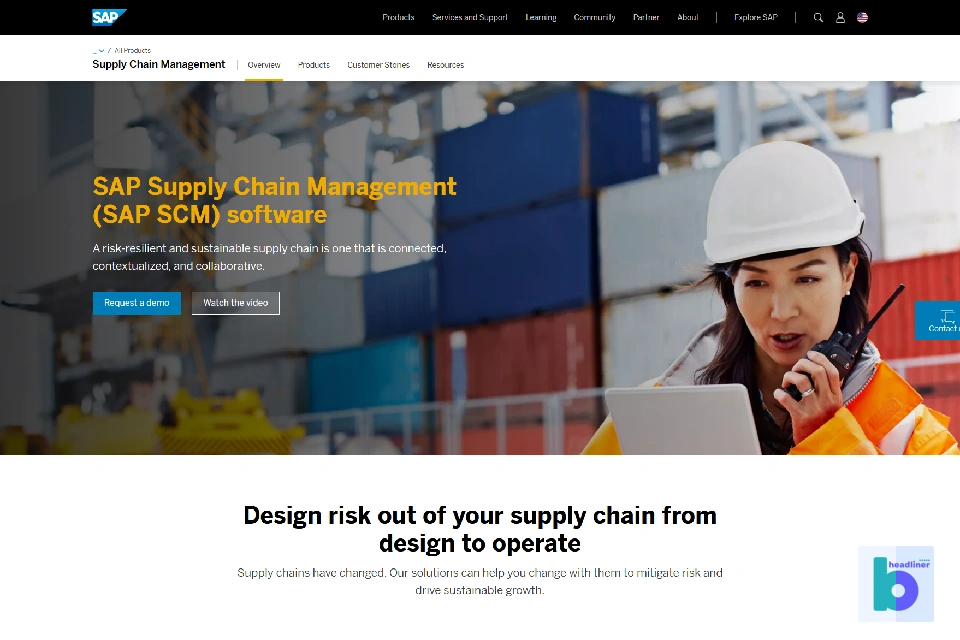
One of the key strengths of SAP SCM software is its ability to enhance supply chain visibility and responsiveness. The platform enables businesses to monitor and track their supply chain activities in real-time, providing insights into inventory levels, demand patterns, and supplier performance.
This visibility allows organizations to proactively identify bottlenecks, mitigate risks, and optimize inventory levels to ensure on-time delivery and minimize costs. SAP SCM also facilitates collaboration among stakeholders within the supply chain network, enabling seamless information sharing, better coordination, and improved decision-making.
SAP SCM offers advanced planning and optimization capabilities to help businesses optimize their supply chain operations. The software leverages sophisticated algorithms and modeling techniques to support demand forecasting, production planning, and inventory optimization.
By analyzing historical data, market trends, and demand patterns, SAP SCM assists organizations in making accurate demand forecasts, optimizing production schedules, and efficiently managing inventory levels. This helps businesses meet customer demands, reduce stock-outs, minimize excess inventory, and enhance overall supply chain efficiency.
42. Blue Yonder
Blue Yonder is a leading provider of supply chain and retail solutions that leverage artificial intelligence (AI) and machine learning (ML) to drive smarter and more efficient operations. The company’s innovative software and platform help businesses optimize their supply chain planning, demand forecasting, inventory management, and logistics processes.
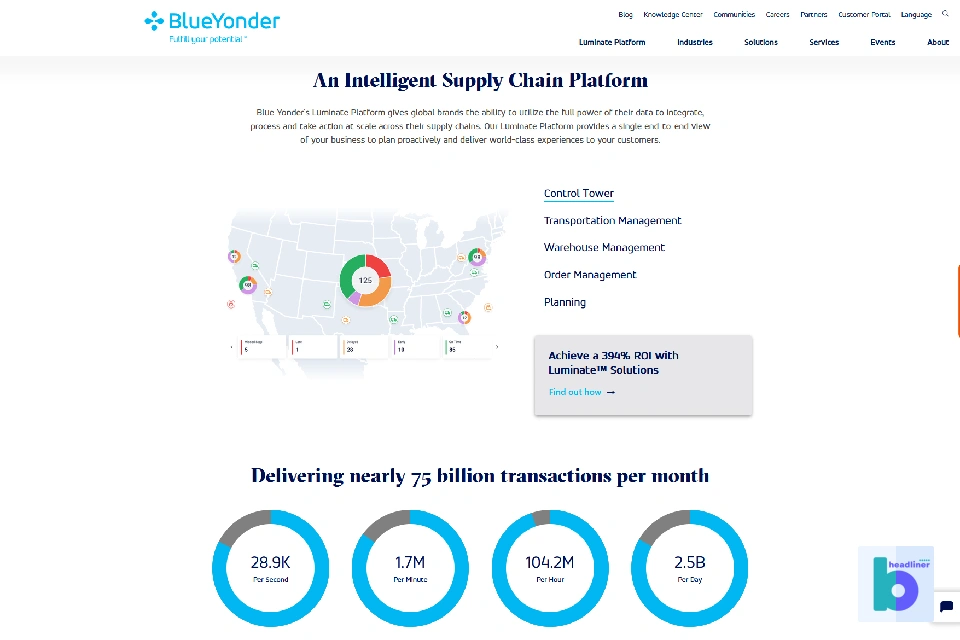
Blue Yonder’s advanced analytics capabilities enable organizations to gain valuable insights into their operations, identify trends, and make data-driven decisions to improve efficiency and customer satisfaction.
One of the key strengths of Blue Yonder is its focus on leveraging AI and ML to enable intelligent and autonomous decision-making. The platform uses predictive and prescriptive analytics to anticipate demand, optimize inventory levels, and automate supply chain processes.
By applying advanced algorithms to large volumes of data, Blue Yonder’s solutions help businesses minimize stock-outs, reduce excess inventory, and improve order fulfillment rates. The company’s AI-driven solutions also enable real-time visibility into supply chain operations, allowing businesses to quickly respond to market fluctuations and customer demands.
Blue Yonder provides end-to-end retail solutions that help organizations optimize their merchandising, pricing, and assortment strategies. The platform combines advanced analytics, machine learning, and automation to assist retailers in making informed decisions about product assortment, pricing strategies, and promotional campaigns.
Blue Yonder’s retail solutions enable businesses to improve customer experiences, increase sales, and enhance operational efficiency by aligning their strategies with consumer preferences and market dynamics.
43. E2open
E2open is a leading provider of cloud-based supply chain management solutions that help businesses effectively manage their end-to-end supply chain operations. The company offers a comprehensive suite of applications and tools designed to optimize supply chain visibility, collaboration, and execution. E2open’s solutions enable organizations to gain real-time insights into their supply chain activities, enhance supplier collaboration, and improve operational efficiency.
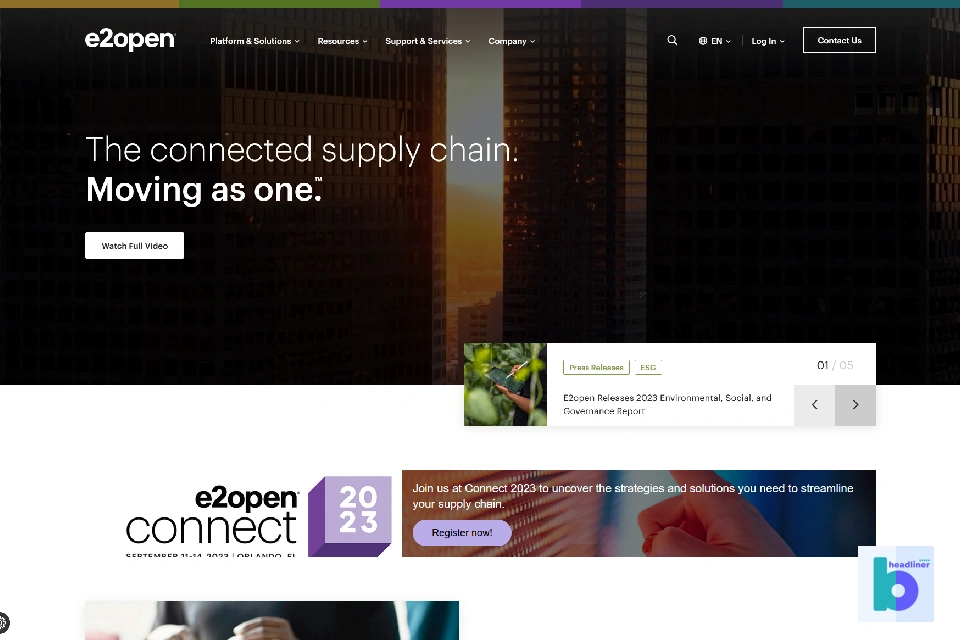
One of the key strengths of E2open is its focus on providing end-to-end supply chain visibility. The platform integrates data from various sources, including suppliers, manufacturers, logistics providers, and customers, to provide a holistic view of the supply chain.
This comprehensive visibility allows businesses to monitor inventory levels, track shipments, and anticipate potential disruptions, enabling them to make proactive decisions and ensure smooth operations. E2open’s collaborative capabilities also enable effective communication and information sharing among supply chain partners, fostering better coordination and responsiveness.
E2open offers advanced analytics and optimization capabilities to help businesses optimize their supply chain processes. The platform leverages data analytics and machine learning algorithms to analyze historical data, identify patterns, and generate actionable insights.
These insights enable organizations to make informed decisions about demand forecasting, inventory optimization, and production planning. E2open’s optimization tools help businesses optimize their supply chain networks, route planning, and resource allocation, enabling them to reduce costs, improve customer service, and enhance overall supply chain efficiency.
44. Oracle
Oracle SCM (Supply Chain Management) Software is a comprehensive suite of applications and tools designed to help businesses streamline and optimize their supply chain operations. The software offers a wide range of functionalities, including demand planning, inventory management, order fulfillment, logistics, and supplier management. Oracle SCM provides end-to-end visibility into the supply chain, enabling businesses to track and manage their operations from procurement to delivery.
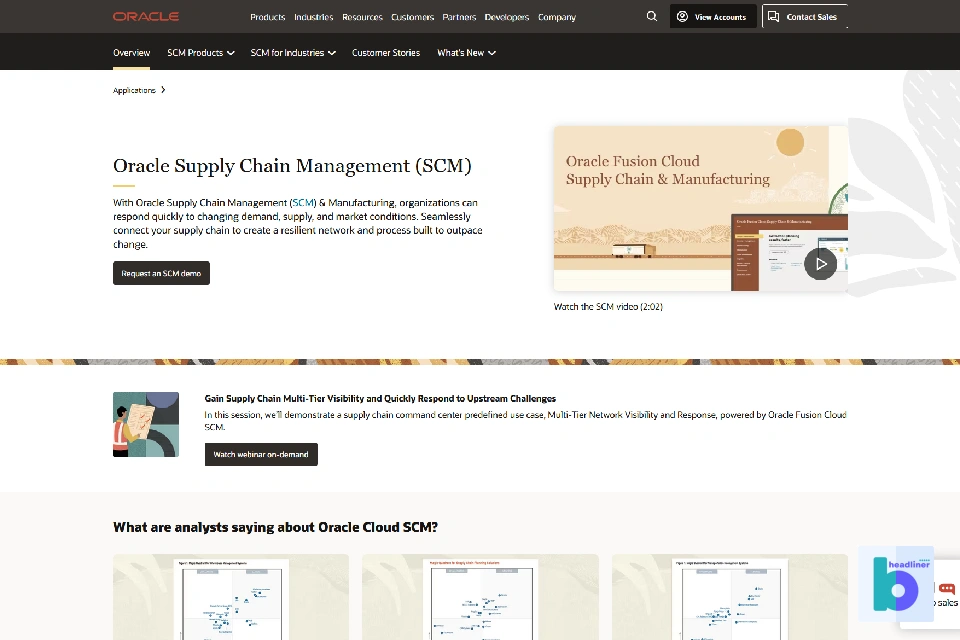
One of the key strengths of Oracle SCM Software is its robust integration capabilities. The platform seamlessly integrates with other Oracle applications, such as Oracle ERP and Oracle CRM, as well as with external systems and partners.
This integration enables smooth data flow across different functions and stakeholders, facilitating better coordination, collaboration, and decision-making. With real-time access to accurate and up-to-date information, businesses can make more informed decisions, optimize inventory levels, and improve supply chain responsiveness.
Oracle SCM Software offers advanced analytics and reporting features that provide valuable insights into supply chain performance and enable data-driven decision-making. The software leverages predictive analytics and machine learning algorithms to help businesses forecast demand, optimize inventory levels, and mitigate supply chain risks.
45. Odoo
Odoo is an open-source, all-in-one business management software that offers a wide range of applications and modules to help businesses streamline their operations. It provides integrated solutions for various business functions, including sales, CRM, inventory management, accounting, project management, and more. With its modular structure, businesses can choose the specific applications they need and easily customize and configure the software to fit their unique requirements.
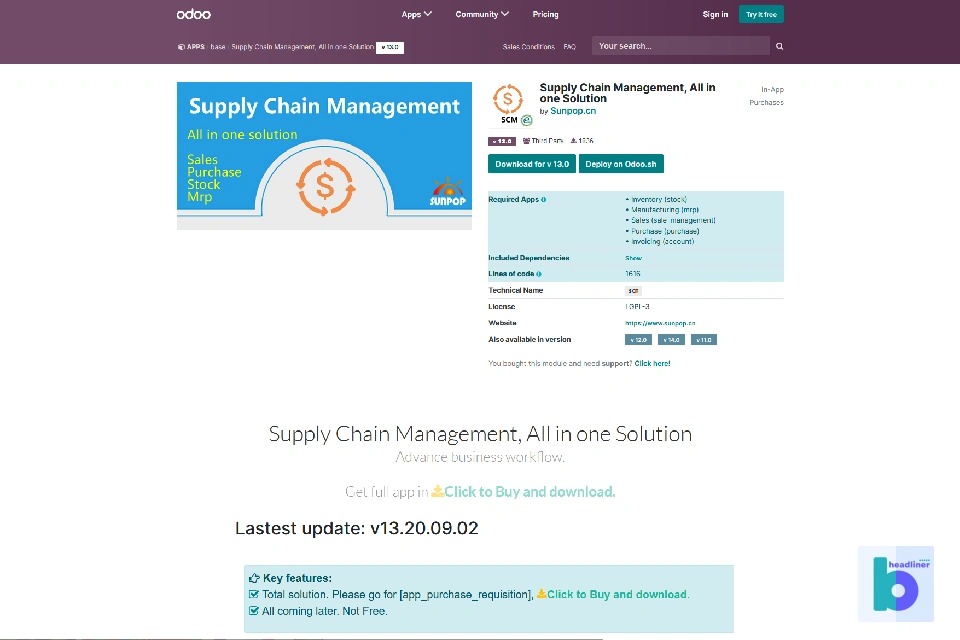
One of the key strengths of Odoo is its flexibility and scalability. The software is highly modular, allowing businesses to start with the applications they need and gradually add more modules as their requirements evolve.
This flexibility enables businesses to tailor Odoo to their specific processes and industry needs, resulting in a more efficient and tailored business management system. Additionally, Odoo is highly scalable and can accommodate the growth and changing needs of businesses of all sizes, from small startups to large enterprises.
Another notable aspect of Odoo is its user-friendly interface and intuitive design. The software offers a clean and modern interface that is easy to navigate and understand, making it accessible to users with varying technical expertise.
The user-friendly design of Odoo contributes to a smooth user experience and reduces the learning curve for employees. Additionally, Odoo provides a centralized database that enables seamless data integration across different modules, facilitating better collaboration and data-driven decision-making.
5 best customer support and help desk software tools
46. Zendesk Support Suite
Zendesk Support Suite is a comprehensive customer support software solution that enables businesses to provide efficient and effective customer service across multiple channels.
The suite combines ticketing, knowledge base, live chat, and other customer engagement tools into a unified platform, allowing businesses to manage customer interactions seamlessly. With Zendesk Support Suite, businesses can deliver personalized and timely support to their customers, enhancing their overall customer experience.
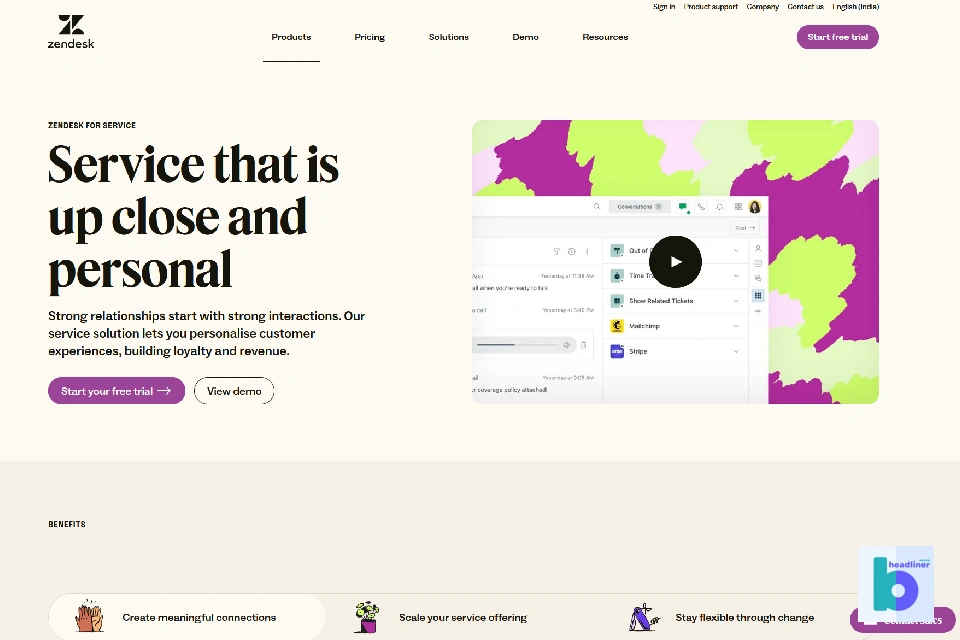
One of the key strengths of Zendesk Support Suite is its multi-channel support capabilities. The platform enables businesses to handle customer queries and issues across various channels, including email, phone, chat, and social media.
This omni-channel approach ensures that customers can reach out for support through their preferred channel, resulting in faster response times and improved customer satisfaction. Zendesk Support Suite also offers automated workflows and intelligent routing, ensuring that customer inquiries are directed to the right agents or teams, further improving efficiency and resolution times.
Zendesk Support Suite provides robust reporting and analytics features that offer valuable insights into customer support performance. The suite generates comprehensive reports and dashboards that highlight key metrics, such as response times, ticket resolution rates, customer satisfaction scores, and agent performance.
47. Zoho Desk
Zoho Desk is a comprehensive help desk software solution designed to streamline customer support operations for businesses of all sizes. The software offers a range of features and tools that facilitate efficient ticket management, knowledge base creation, self-service support, and customer engagement. With Zoho Desk, businesses can effectively track, prioritize, and resolve customer inquiries, ensuring timely and satisfactory support.
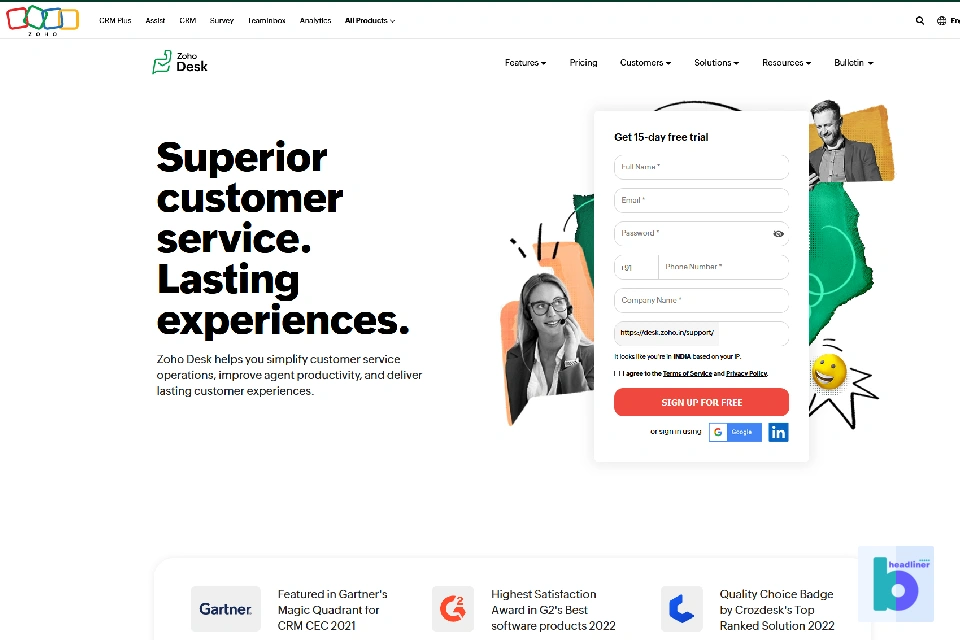
One of the key strengths of Zoho Desk is its focus on providing a seamless and personalized customer support experience. The software offers multi-channel support, allowing businesses to handle customer inquiries from various sources such as email, phone, live chat, social media, and more. Zoho Desk’s unified inbox consolidates all customer interactions in one place, enabling support agents to have a holistic view of customer communication.
The software provides customizable ticket workflows and automations, ensuring that customer inquiries are assigned to the right agents and resolved efficiently. Zoho Desk also offers a self-service portal where customers can access a knowledge base, FAQs, and community forums to find answers to their questions, reducing the need for agent intervention and empowering customers with self-help options.
Zoho Desk provides robust reporting and analytics capabilities to help businesses measure and improve their customer support performance. The software generates insightful reports and dashboards that provide real-time visibility into key support metrics, such as ticket volume, resolution times, customer satisfaction ratings, and agent productivity.
48. Freshdesk
Freshdesk is a cloud-based customer support software that empowers businesses to deliver exceptional customer service and support experiences. The software offers a comprehensive set of tools and features to manage customer inquiries, automate workflows, collaborate with team members, and track customer satisfaction. Freshdesk enables businesses to streamline their support operations and efficiently handle customer tickets, ensuring timely and effective resolution.
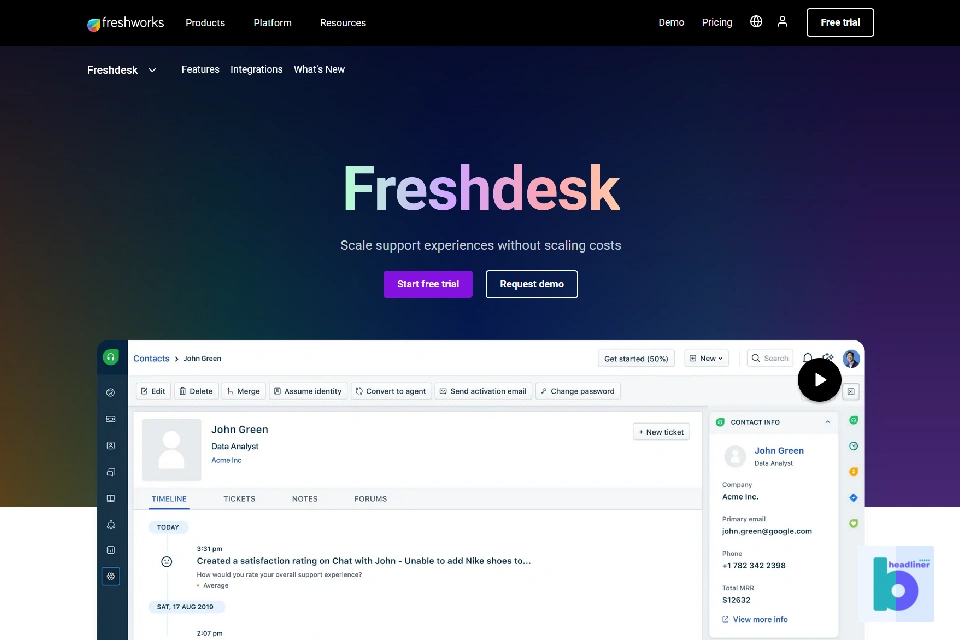
One of the key strengths of Freshdesk is its intuitive and user-friendly interface. The software provides a clean and organized dashboard that allows support agents to easily manage and prioritize tickets. With its centralized inbox, agents can efficiently handle customer inquiries from various channels, including email, phone, live chat, social media, and more.
Freshdesk also offers ticket management features such as ticket assignment, categorization, and escalation, ensuring that inquiries are directed to the right agents and resolved within the specified SLAs.
Freshdesk provides robust collaboration and knowledge management features to enhance team efficiency and customer self-service. The software enables agents to collaborate with internal teams and subject matter experts, facilitating quick and accurate issue resolution.
49. Hiver
Hiver is a collaborative email management software designed to enhance team productivity and streamline email workflows. With its focus on transforming Gmail into a powerful shared inbox, Hiver allows teams to collaborate on email conversations, delegate tasks, and manage customer support or sales queries seamlessly.

By centralizing communication within Gmail, Hiver eliminates the need for external tools or complicated integrations, providing a simple and efficient solution for teams to work together effectively. One of the key strengths of Hiver is its intuitive and user-friendly interface. The software seamlessly integrates with Gmail, providing a familiar environment for users to manage their emails.
Hiver’s shared inbox feature allows team members to assign emails, leave internal notes, and track the status of conversations, ensuring that nothing falls through the cracks. It facilitates smooth collaboration by enabling team members to share email threads and provide feedback or suggestions directly within Gmail, eliminating the need for cumbersome forwarding or CCing of emails.
Hiver offers automation features to streamline email workflows and reduce manual tasks. Users can set up rules and workflows to automate email routing, tagging, and assignment based on predefined criteria. This helps teams prioritize and distribute emails efficiently, ensuring that every email is handled promptly.
50. Help Scout
Help Scout is a customer service software platform that aims to simplify and personalize customer support experiences. It provides a suite of tools that help businesses manage customer inquiries, collaborate with team members, and deliver exceptional support. With its user-friendly interface and intuitive features, Help Scout enables businesses to streamline their support processes and build stronger customer relationships.
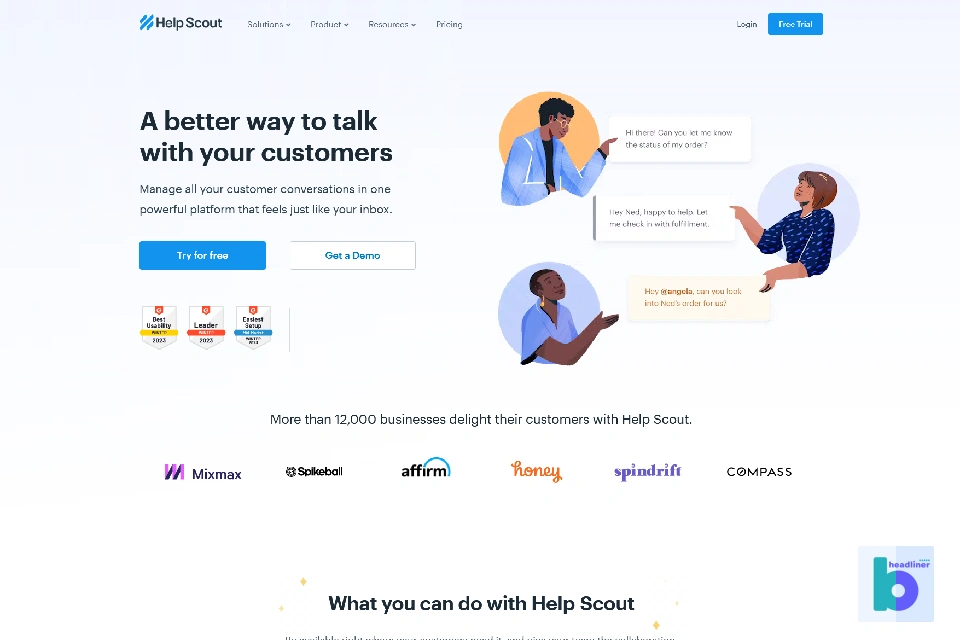
One of the key strengths of Help Scout is its emphasis on personalized customer interactions. The software allows businesses to create personalized customer profiles that provide valuable information about customer history, preferences, and previous interactions.
This enables support agents to have contextual conversations and provide tailored solutions, resulting in a more personalized support experience. Help Scout also offers email automation and templates that help teams deliver consistent and efficient responses, saving time and ensuring a high level of customer service.
Help Scout fosters collaboration and transparency within support teams. It provides shared inboxes and conversation assignments, allowing multiple team members to work together on resolving customer inquiries. Help Scout’s collaboration features enable seamless internal communication, allowing agents to leave notes, discuss customer issues, and collaborate on finding the best solutions.
This promotes knowledge sharing, enhances team productivity, and ensures that customers receive prompt and accurate responses. With its focus on personalized support and collaboration, Help Scout empowers businesses to deliver exceptional customer experiences and build long-lasting customer relationships.
Conclusion
The world of business software tools offers a wide range of solutions to help organizations streamline their operations, enhance productivity, and drive growth. Whether it’s ERP systems like Oracle NetSuite and Epicor, CRM platforms like Salesforce and HubSpot, or project management tools like Asana and Trello, each software tool brings its own unique set of features and benefits to the table.
The best software tools for businesses are those that align with the specific needs and goals of the organization, providing comprehensive functionality, scalability, and ease of use.
The right business software tool can significantly improve efficiency, collaboration, and decision-making within an organization. It allows businesses to automate processes, gain insights from data, enhance customer relationships, and adapt to evolving market demands.
However, it’s important to carefully consider the pros and cons of each tool, as well as factors such as cost, customization options, and implementation complexity. Hope this article for the 50 software tools for businesses that are best has helped you chose the one that suites your organizational needs.


